#me: I find the concept of those characters their actions and the implication of how they got that way really fascinating
Explore tagged Tumblr posts
Text
Me: rewatching chapters 2&3 (Dead Man's Worth episodes)
Luke-as-Delacy: mentions that on the farm the working day would be half done by 6 am and calls Bellows lazy.
Me: I bet Delacy and almost everyone else on that farm got up with the rooster's first crow... wait a goodamn minute
Just imagine if someone dropped that phrase around Delacy in episode 2, and he just took his gun out and went "Hmmm". (Bonus points for an extra "almost-parental Don't" from Nate, because he's the only one in the group who certainly knows that revolver is named Rooster). Also, I'm surprised no one tried to make the punchline "Guess he was a night owl. Stayed up well past Rooster's first crow". (That would've been a Ellen's line if she was in that episode).
Also, the fact that Bellows tried (without much enthusiasm, but still) to recruit Garnet and Delacy is so funny as a concept: there's just something about those people that makes them irresistible for particularily violent Horsemen of the Apocalypse (relatively speaking: all Horsemen here aren't above doing violent things, War and Conquest are just the most direct about it)
#oxventure deadlands#oxventure deadlands spoilers#me: I find the concept of those characters their actions and the implication of how they got that way really fascinating#also me: I'm going to put those Beasts into Situations 😈
10 notes
·
View notes
Text
Let's Talk About How Book 3 Ruined Aang
If you've seen any of my prior ATLA posts, you know that I don't hate Aang. In fact, I quite liked him in Books 1 and 2. He was flawed, as all characters should be, but the show didn't shy away from those flaws or justify them. He was called out for burning Katara and rushing his firebending, Sokka and Katara were rightfully upset when he hid Hakoda's letter, he willingly owns up to the fact that his actions helped drive Toph away, and his entire arc after losing Appa and finding hope again in The Serpent's Path was beautifully done.
(Hell, even in The Great Divide Katara says what Aang did was wrong and he agrees. It's played for comedy, but the show still makes the effort to point out that what he did wasn't the right thing to do. You're just meant to understand that he was fed up and acted off of that)
Those flaws and mistakes were addressed and improved upon and helped Aang to grow as a character.
But for some reason, that aspect of Aang's character was completely flipped in Book 3.
The best examples of this are in both TDBS and EIP. Both the show and the fandom are too quick to brush off that Aang kissed Katara twice without her consent, one of which after she explicitly said she was confused about her feelings.
(And yes, she is angry in response and Aang calls himself an idiot. But after this, it isn't really addressed. They go on like nothing happened for the rest of the episode. Aang's lamentation comes from screwing things up with her romantically, not that he violated boundaries)
The show never really addressed why what he did was wrong. Not only because he wasn't given consent, but also because both times he isn't thinking about what Katara wants. In both instances, Aang is only thinking about himself and his feelings. This is something that persists through a lot of the third book. And by Sozin's Comet it ultimately ruins any character development he had built up in the second book.
One thing I feel was completely disregarded was the concept of having to let go of Katara in order to master the Avatar State.
For me, the implication wasn't that he had to give up love or happiness necessarily. He was emotionally attached to and reliant on Katara, to the point where she was needed to stop him from hurting everyone around him and himself. This is obviously detrimental to his functionality as the Avatar. And the point of him "letting her go" wasn't that he had to stop caring about her, it was that his emotional dependency on her was stopping him from being the Avatar he needed to be and that was what needed to be fixed. I don't even think it's about the Avatar State itself, it's about being able to keep your emotions and duty as the Avatar separate.
(If you look at Roku, he loved and had a wife. It wasn't his love for her that messed everything up, it was his attachment to Sozin. He wasn't able to let Sozin go and not only did he lose his life for it, the world suffered for it. It's the unhealthy attachments that seem to be detrimental, not love itself)
And Aang realizes that in the catacombs, which is how he's able to easily enter the Avatar State and seemingly control it. He let Katara go.
So then why does it seem like his attachment to Katara is not only stronger, but worse in mannerism? He liked Katara in Books 1 and 2- obviously- but he was never overly jealous of Jet or Haru. He only makes one harmless comment in Book 2 when Sokka suggests Katara kiss Jet.
But suddenly he's insanely jealous of Zuko (to the point of getting frustrated with Katara over it), off the basis of the actions of actors in a clearly misrepresentative play. Katara showed a lot more interest in Jet and Aang was completely fine with it.
(Speaking of EIP, Aang's reaction to being played by a woman was interesting. He wore a flower crown in The Cave of Two Lovers. He wove Katara a flower necklace. He wore Kyoshi's clothes and makeup and made a funny girl voice. He willingly responded to Twinkle Toes and had no issue being called that. And for some reason he's genuinely upset about being played by a woman? Aang in Books 1 and 2 would have laughed and enjoyed the show like Toph did. His aversion to feminity felt vastly out of character)
I guess my point is, why did that change? Why was Aang letting go of Katara suddenly irrelevant to the Avatar State? It felt like him letting go was supposed to be a major part of his development. Why did that stop?
Myself and many others have talked about The Southern Raiders. The jist of my thought process about it is his assumption that he knew what was best for Katara. And the episode doesn't really call out why he was wrong. Maybe sparing Yon Rha was better for Katara, maybe it wasn't (the only one who's allowed to make that choice is her). Pushing forgiveness? That was wrong. But the episode has Zuko say that Aang was right when the course of action Katara took wasn't what Aang suggested.
Katara's lesson here was that killing him wouldn't bring back her mother or mend the pain she was going through and that Yon Rha wasn't worth the effort. That's what she realizes. Not that she needed to embrace forgiveness. How could she ever forgive that? The episode saying Aang was right wasn't true. Yes she forgives Zuko, but that wasn't what Aang was talking about. He was specifically talking about Yon Rha.
And that was wrong. Aang can choose the path of forgiveness, that's fine. That's his choice. But dismissing Katara's trauma in favor of his morals and upbringing wasn't okay.
I know it sounds like this is just bashing Kataang. But it's not simply because I don't like Kataang, in my opinion it brings down Aang's character too, not just Katara's. But let's steer away from Kataang and Katara for a minute.
The one thing that solidifies Aang's character being ruined in Book 3 for me is the fact that he- at the end of the story- does the same thing he did in the beginning.
He runs away when things get hard.
Aang couldn't make the choice between his duty and his morals. So he ran. Maybe it wasn't intentional, but subconsciously he wanted an out. And this is really disappointing when one of the things he was firm about in Book 2 was not running anymore. His character went backwards here and that's not even getting into the real issue in Sozin's Comet.
There's been contention about the Lion Turtle intervention. For many- including myself- it's very deus ex machina to save Aang from having to make a hard decision. And that in turn doesn't reflect kindly on his character.
Everyone- Sokka, Zuko, Roku, Kyoshi, Kuruk, and Yangchen (who was another Airbender and was raised with the same beliefs he was and would understand which was the whole point of him talking to her)- told him he had to kill Ozai. They all told him it was the only way. And he refused to listen to any of them, rotating through his past lives until he was given the answer he wanted.
And before anyone says that I'm bashing Aang for following his culture, I'm not. Ending the war peacefully, in my opinion, wasn't the problem. In a way, I think it allowed the world to heal properly. However, that doesn't make up for the fact that Aang refused to make a choice and face the consequences of that choice. Instead, he's given an out at the very last second.
Even if he couldn't kill Ozai and someone else had to deliver the final blow, that would have been better than the Lion Turtle showing up and giving him a power no one's ever had before. It would have been a good compromise, he doesn't have to have blood directly on his hands but what needs to be done needs to still get done. It would also show that being the Avatar isn't a burden he has to bear alone. That when things get hard, he can't run away but he can rely on the people closest to him to help him through hard decisions.
All these issues aren't necessarily a problem with Aang. Aang prior to Book 3 didn't have most of these problems. This is a problem with the way he was handled
#aang critical#anti aang#tagging just in case#i don't want aang stans accusing me of cross tagging#it's really not anti aang tho#long post#anti bryke#this is their fault#look how they massacred my boy#anti kataang#katara deserved better#she's not the focus here#but i thought I'd add that there#character analysis#atla critical#anti book 3#which is kind of an exaggeration#because a lot of book 3 is great#it's just most of the latter half
326 notes
·
View notes
Text
BL: Romancing in a Bubble?
As always, please let me know if you have suggestions, critiques, comments or corrections.
I will only be discussing BL broadly (here I use BL as an umbrella term) and not just live action. I don’t want to club together BL and GL since in spite of their shared roots they are very different in their genre conventions, target demographics, and history. Also, I am not very familiar with it.
youtube
I consider BL a genre in itself – practically well as the way Masala is a cinema genre.
Please check the content/trigger warnings before diving into the works I have mentioned below. Feel free to message or ask.
BL / romance
I don’t think BL is romance or even a sub-genre of romance. A lot of BL is romance. Many more of them have at least a romantic side to them. There is enough overlap between those genres to give the impression that BL is romance. (I remember the discussion Killing Stalking had prompted.)
But there are plenty of BL devoid of romance. Like One Room Angel, Social Reform Season, and The Orc Bride. Similarly, BL is not exactly a porn sub-genre even though there are plenty of ero-BL.
Also, there are plenty of BL where romance takes backseat such as The Night Beyond the Tricornered Window, Blue Morning, Brother, Lawless Gangster and Thousand Autumns.
BL / queer
Queer – Can I call it a genre the way I call BL a genre? Even if one were to ignore queer as method in academia, it is still so complex.
Let me quote Taiwanese tongzhi (queer) author Chiang-Sheng Kuo:
[W]hat exactly is queer literature? Is it queer literature if queer people like to read it, or is it only queer literature if there are queer characters in the books? Or is it an appendage of the queer movement? If a queer author writes a book without queer characters, does that represent a certain aspect of queer culture?
(You can find the whole interview here.)
I think the problem persist even when I think of queer as a label.
Then there is the issue with conception of “queerness” itself. Like, in a way it is a limiting term. Is it fair to call normative or customary male-male erotic practices such as masti and Launda Naach, “queer” just because that’s how it is perceived elsewhere now?
To quote what Kaustav Bakshi wrote in Writing the LGBTIHQ+ movement in Bangla:
In the last decade, the question of decolonizing queer epistemologies was being raised periodically, whereby queer politics, despite having a shared agenda of toppling heteronormativity, and queer culture, albeit having a shared aesthetics, became more and more regionalist – not in a negative sense – but, with implications of difference, which can be interpreted and understood only when one subjectively experiences the ‘region’ with respect to gender, class, caste, ethnicity, physical and intellectual ability, access to education, metropolitan cultures, and most importantly, the internet.
[T]he attraction towards the launda is not understood as ‘queer’ – non-normative or out of the ordinary – but, as an integral part of sexual life, which is not always compulsively alert to the heterosexual-homosexual binary.
Imo, decolonizing queer epistemologies comes in handy when discussing BL since there are plenty of BL dealing with:
Historical BL set in eras and locations that had customary male-male sexualities and practices.
BL with special settings, like omegaverse, with different (if any) idea of queerness.
BL / other queer content
Just as Japan has gei-comi, and other manga like Shoujo Manga Artist Minamoto-San Comes Out, and Kieta Hatsukoi (shoujo), What Did You Eat Yesterday and My Brother's Husband (seinen) beside BL manga, different countries offer diversity in queer content with noticeable overlap. But clubbing them together would not be easy. Moreover, this diversity is as much cross-sectional as it is temporal (tanbi, JUNE, shonen ai, yaoi, BL in Japan).
BL the main difference between BL and other queer genres is BL’s focus on moe (affect). Anyway, BL predates LGBTQ+ acronym. It predates de-pathologization of homosexuality in many BL creating regions. Fu-people (BL fans) were creating BL before mainstream media started representing queer people in media. Fu-people battled state and its censors everywhere along with queer people. Live action BL is commercialized and we get mostly feel-good content. But that is capitalism (and the State) reaping the dividends of decades of fu-people’s labor of love.
I wonder if it is apt to consider BL the way western queer shows (such Verbotene Liebe, Queer as Folks, Os Nossos Dias and SKAM) as benchmark when discussing BL? Won’t it be better to evaluate consider BL in relation to local non-BL queer content in BL producing countries? But then, there are BL inspired by western queer culture such as Partners by Tamaki Yura.
Here are three gei-comi that I recommend for BL audience, through which they can get an insight into non-BL queer manga from Japan (created with androphilic men as target audience) :
Fire Code by Ichikawa Kazuhide
Fisherman's Lodge by Gengoroh Tagame
Coming Home by Go Fujimoto
Here is my BL versus gei-comi list which I think highlights their differences and similarities (I have included only Gengoroh Tagame’s works since they are probably the easiest to access/buy/borrow):
Do You Remember South Island P.O.W. Camp? by Gengoroh Tagame || Hitori de Yoru wa Koerarenai by Matsumoto Yoh
Arena by Gengoroh Tagame || Jinx by Mingwa
Cretian Cow by Gengoroh Tagame || The Orc Bride by Madobuchiya (Nishin)
Uo to Mizu by Gengoroh Tagame || Terpenoid by Okadaya Tetuzoh
My Brother's Husband by Gengoroh Tagame || The Story of My Brother by Ike Reibun
There is lot of overlap between BL and gei-comi. Gengoroh Tagame first published in JUNE (a magazine that contributed to BL we know now). There are magazines and anthologies (Nikutaiha BL) that offer crossover between different streams of queer content.
Similarly, there are danmei (Chinese BL) novel written by queer men such as the autobiographical works: Six Records of a Floating Life and Waiting Until 35 Years Old by NanKang BaiQi and Bei Cheng Tian Jie (北城天街) by FeiTian YeXiang.
BL / Queerness - exploration and conflict
Here are some live action BL (I’m not including some of the more famous ones like TharnType and Wedding Plan) where plot is rooted in character’s queerness and its exploration or implications:
Lan Yu – first danmei to get live action adaptation. The central conflict is rooted in the queerness of its characters, particularly Chen HanDong.
A Round Trip to Love and Irresistible Love – based on danmei by Lan Lin. These are part of a shared universe. The former has both ‘coming out’ (Cheng Yichen) and ‘leaving home’ (Lu Feng). In the latter, all the conflict is rooted in compulsory heterosexuality and we get the perspective of not only an amphiphilic (bisexual) man (Xie Yan) but also an amphiphilic woman (Xia Jun) of the same social class.
Boys Love: The Movie
No Touching At All (2014)
Udagawachou de Matteteyo (2015)
The Cornered Mouse Dreams of Cheese
Sing in Love (2022) – Queerness is part of the main conflict.
Mood Indigo
Life: Senjou no Bokura
Light on Me
I don’t keep track of these things usually, so this is based off memory.
In Japan, most BL has dealt with the struggles of being queer in a largely heterosexist society since the days of tanbi and shonen-ai (such as Zankoku Na Kami Ga Shihai Suru by Hagio Moto). JUNE gained notoriety for focusing on it and yaoi boom was movement away from that. Then yaoi gained notoriety for existing in a bubble. When BL started to treat heterosexism in society as a part of the narrative, it garnered praise for being ‘transformative’.
BL has managed to carry within it different modes of identity and queerness.
Take Okane ga Nai (No Money) by Hitoyo Shinozaki and Toru Kousaka for example.
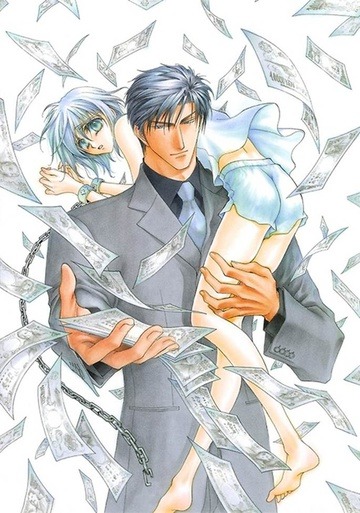


It is often held up as the epitome of all that is wrong with BL (or yaoi as anglophone fandom calls it). What’s less talked about is the main character, Ayase Yukiya’s queer angst and his exploration of identity that spans several volumes of the manga series. Kano on the other hand doesn’t struggle with his identity at all since his attraction to Ayase is driven by a very strong, initially unreciprocated emotional connection dependency (formed when his father died and he was at his lowest). For him, sexuality is merely a form of expression of his attraction for Ayase. Therefore, it does not inform his identity in anyway.
Within cannon, Someya and Honda’s pairing offer contrast to Ayase and Kano’s pairing. In a way, Kano and Someya have post-queer and pre-queer identities, respectively. Someya is a self-actualized person who mentors other queer characters (club staff, Ayase, Honda, Kano). There is a lot of give and take that happens between Ayase and all the queer people he meets at Someya’s club. Ayase's and Honda’s struggles with identity and sexuality are juxtaposed with Kano's and Someya's self-assured disposition.
That is also why I don’t think I Told Sunset About You stands out much. It can easily fit into the BL fold because there are plenty of BL that approached the same theme as I Told Sunset About You in a similar fashion (including these live action BL: His - Koisuru Tsumori Nante Nakatta, Life: Senjou no Bokura and The Cornered Mouse Dreams of Cheese).
I recommend the danmei novel Sissy by Shui QianCheng, the author of the works Beloved Enemy, My Stand-In and Meet You at the Blossom are based on, for a more detailed exploration of heterosexism, including femmephobia and homophobia.
Sissy, Beloved Enemy and Professional Body Double (the novel My Stand-in is based on) are all part of 188 group (a shared universe of novels).
There are plenty of other BL from other region that are focus on themes such as heterosexism and compulsory heterosexuality. Here is such a one-shot: Romantic by Motoni Modoru (part of the anthology Tanbishugi).
BL / terms
I like BL and associated terms like danmei because of the culture and the history associated with those terms. Tanbi and danmei are different readings of same characters 耽美 but they represent very different things. Shonen-ai literally translate to boy(s) love but that term (or BRM (boys’ romantic manga) as Emiko Nozawa puts it) carries within it so much history and specific artistic styles and sensibilities. Waai is derived from yaoi/yuri but there are fu-cultural processes, very different from that of yaoi creation, behind the production of Y-novels. I learned a lot from exploring these words alone.
#japanese bl#korean bl#thai bl#bl meta#ql meta#homophobia#heterosexism#queer#queer media#queer culture#gei-comi#gei comi#bl recommendation#danmei#188 group#188男团#bl analysis#asian ql#ql dramas#I Told Sunset About You#itsay#no money#Okane ga Nai#multiple works mentioned#chinese bl
28 notes
·
View notes
Text
Let's talk about Forgotten Elegy!
Hey since the mods all blocked me preventing any sort of communication I'd like to expose what has been going on in there! Apparently because it makes people uncomfortable to say what's going on.
So the current plot in TimberClan involves an outsider group in which previous members caused problems for the group. Now no player was warned about what this group was going to face going in. Instead we were faced with erin hunter level anti-outsider xenophobic rhetoric.
Now as some of you may know... I am not white! In fact I am of arabic descent, which, as some of you know are not exactly a favorite when it comes to immigrants!
Some topics mentioned include:
A cat taking on the name of the colony's god to piss them off this was treated as funny!
Likening their burial practices to like prey or trash.
Treating the entire group as murderers when only one cat maybe did something.
Pining the blame on the group for a disappearance they had no paw in.
Calling the colony brutes and relating their distrust to their culture of fighting assuming they love fighting and shit because of it.
Keeping the colony prisoner for an extended period of time
Implying the colony should be grateful for receiving "food" and "shelter" while being kept prisoner and if they weren't they'd be ungrateful.
Having a literal concept of "the good ones" with the colony having the main captor the leader Scoutstar have a colony cat, Velvet, as her watcher to make sure the colony weren't stepping out of line. Allegories being made towards a dog on a leash.
Making cats who believe the treatment is wrong feel stupid and afraid of siding with them!
Oh this entire plot is suppose to end with the colony joining Timberclan despite the foul treatment!
Constant jokes about how the worst offenders did nothing wrong especially Scoutstar who is, as pointed out by her player, taking her paranoia out on the group but its "for the good of her clan" so i guess that makes it ok right?
Now call me not white but all of this sounds pretty bad!
Mmy way of engaging such things, as someone who has experienced similar things, would be to call it what it is that should be alright shouldn't it? After all as they told me this is an Adult Rp where we can talk about Adult Themes after all!
WRONG!
Apparently calling these cat's behaviors and the plot for what it is has made people "uncomfortable" and that members did not enjoy how I was commenting on their characters because of how people turned it to real resentment in the past.
I will have you know FE that trying to block me from speaking and being a hawk over whatever I say has made me more resentful that a character's actions!
I am an adult and I find it quite insulting you apparently think I cannot separate those things and have childishly blocked me rather than talk like adults as I didn't even want to repeal the decision. However because members were uncomfortable that was apparently enough, yet the real world rhetoric that was being used, despite asking for it to be tagged never was! In fact I had to get blasted with comments and sentiments like those above without any sort of content warning. Basically getting my cat experiencing bigotry like mine without so much as a warning despite "the obvious" needing to be tagged.
Instead of anyone, staff or complaining members alike, putting on their big boy pants and dealing with the implications of the plot they were in they rather cry and whine about the consequences of their actions and the fact it didn't make their little kitty look all that good. Such is natural for whites and the people who ride their dicks.
Now I can personally say there are plenty of members who agree with me that this so if you think blocking and kicking me is getting you out of this you are sorely mistaken! In fact they are quite pissed off with how staff handled things in kicking me for what they also agree were appreciating the writing from a standpoint of someone who is a real life victim of what this plot showcases. Isn't that funny! I know that my friend who I mentioned to you is still there!
In fact a lot of the comments the cats in this rp have used have been almost word for word shit I've heard and shit my family and people like me have heard! Yet I'm the bad guy for making a comment about it.
All of this is to say I am in fact hurt and know that you all don't like me because I didn't roll over and take being put through a xenophobic plot without comment and called cats xenophobic for actions I saw!
So I am returning the energy you have given me! I think you are all unprofessional and have been for most of the controversies your group has been involved in. You run away from what the issue is and refuse communication then turn around in blaming the lack of communication for the reason why these things happen.
I'm sorry me engaging with a plot you crafted as a person effected by the very concepts you are putting into it offended you same with all the other little members who whined about it!
Actually that was sarcasm I am not fucking sorry. You all need to grow the fuck up and perhaps can this plot because you clearly cannot handle something as delicate as this without being xenophobic and racist. Just call me a fucking terrorist or towelhead or a camel jockey next time it'll be much more direct!
24 notes
·
View notes
Note
Idk if I'm alone here but when I first played DPPT I always thought the one book in the Veilstone library that mentions that Mesprit can erase the emotions of anyone who touches it was specifically meant to explain Cyrus's behavior and his hatred of emotion. Especially since he literally has Mesprit held captive at one point, surely it wouldn't be too hard for him to just go to the basement and slap it across the face or smth. That always kinda felt like a missed opportunity to me. Not that I don't like how USUM and Masters handled his character but it would have been interesting to see.
Sorry, but I don't think that would have worked as an explanation for Cyrus' actions and attitudes, nor would it have been a good direction for his character.
For one thing, Cyrus isn't particularly unemotional in the DPPT. He speaks with a lot of exclamation marks, fights you for no reason other than because your compassion for the lake trio annoyed him, and becomes very angry and promises to crush you after his defeat. In Platinum, he even goes on a tirade about how angry he is due to his incomplete spirit. Some of that happened after the capture of the lake trio, so he must not have touched it.
Even aside from that, though, Cyrus' actions aren't rational at all. It isn't logical or rational to want to get rid of emotions, because they're what cause living beings to do things like tend to their young, form communities, and avoid danger. If Cyrus was truly a logic-driven machine, it would carry the implication that everything he did was rational, which, considering that his actions include terrorism, self-isolation, and being a dick to his underlings, would either demonize logic excessively or worse, imply that human decency and connection isn't logical.
Finally, I don't like the idea of Cyrus being an emotionless husk because I find the psychological aspects of his character, such as his desires to avoid pain, make himself into his idea of perfect, and prove himself, to be more interesting than if he were just a robot with no real desires. Saturn really said it best when he said that Cyrus is fascinating for his will, passion, and hypocrisy, all of which he hates in himself.
For those reasons, I don't think it would be a good idea to do that in canon. However, it would be very interesting to look at in fanfiction, and that could go a number of different ways:
Cyrus does touch Mesprit while he has it captive. As he gradually loses his emotions, he finds it soothing but is also rapidly losing his will to do much of anything. Towards the end, he realizes that he only wanted to eliminate emotion because he was in pain, and his perfect world would be a nightmare. His final order before handing the commands over to Saturn is to stop the New World project immediately.
This wouldn't be the most compliant with canon or with what I think a cursed person would be like, but it would be interesting to explore what it would be like if Cyrus had actually been touched by a Mesprit as a child. Distractions like his rotom no longer appeal to him, abuse and exclusion no longer affect him, and he can do whatever his parents ask of him. Except make friends... or love them... or understand concepts like love or friendship in general... or conform to a standard understanding of morality... or understand why others are so irrational. But that's alright. Without distractions like that, he has a grander goal in mind.
Cyrus seeks out Mesprit to be cursed after his plan fails. Days later, his commanders find him lying inert on the grass and drag him back to headquarters to take care of him. It's tragic.
Thanks for the opportunity to ramble! Sorry if it's not quite what you wanted to hear.
7 notes
·
View notes
Note
I wanna say that I absolutely love your post apocalypse ranchers au. Theoretically I love post apocalypse stories, but most ones end up just being 'everyone sucks and is terrible to each other all the time' which i hate. But yours just has all the community and inherent goodness of people that I really wish was in more post apocalypse media. (I also love the layout, smthn about the little portrait scenes with a few lines' description is a really nice format to me. it's like a blog almost)
idk if this is coherent but basically i love the post apocalypse au and I so wish there were other stories like it out there
I apparently had even more thoughts on this than I anticipated even after forcing myself not to talk about most of it, so borderline essay below...
It's much more common in video games but I get what you mean.
Honestly I think it's an issue of American apocalypse media, and the general intent people go into with the genre. Usually when you're writing a man-made apocalypse story it's to say something about society, and if it's a man-made apocalypse you can generally assume it's not something positive, especially given the sort of person that type of story would attract.
The American aspect I won't get into cause that might be a bit too spicy, but I'll just say if you look at fiction from places with more socialist or collectivist attitudes (that's not specifically influenced by American media or trashy escapist fantasy for edgy teenagers) you find those qualities depicted more. In American apocalypse stories altruism is more of a notably heroic trait for the MC.
(I think the concept of an apocalypse might also just much more terrifying and unknown to North American audiences. Things like relics outside of museums and casually decorating the scenery with ruins is more common in Eurasian media. Ancient history, and the implications thereof, is much more tangible there. I don't think an American version of digimon adventures would ever conceive the digital world as it's presented without drawing attention to it as something tragic and sombre, for example. Probably a whole essay could be written why but this is already too long.)
I think it's also because it doesn't really match well with action and horror genres, which is what apocalypse stories are usually paired with. Apocalypse ranchers is a survival slice or life, and cozy, and the format isn't very conducive to complex action, so there's no need to include it.
In an action story you focus on the action, and physical conflict drives action, and in a horror story the conflict has to scare you, usually involving tragedy. In a survival story the minutia is more important, and in a slice of life the conflict is more mundane. So, I guess that's to say there's more breathing room in RAAU to depict the more realistic daily interactions with people that are ostensibly int he same situation as the ranchers - average people who happened to survive.
I do understand that frustration though. I write a lot of post-apocalypse fiction myself, and this is usually how I would write characters acting simply because that's how I would act, if not out of altruism, then out of practicality.
Um, the restaurant for example. The ranchers are on foot and already overladen with their winter supplies, and they've come to a place that's already established a chain of charity. It's more food than they will need before they're likely to find even more food, and it will be more of a burden to carry it all. In a space that's already established itself as a charitable one people are more likely to return the favour. Think about all those stories you hear about people in fast food drive thrus paying for the person behind them for dozens of cars in a row. Of course there's always gonna be someone who breaks the chain, but that's one person in however many people before them, and it's not necessarily because they're a villain.
(There's also a pretty blatant cottagecore/solarpunk wish fulfillment aspect to the apocalypse fiction I like to write not gonna lie.)
Anyways, I guess that's all to say that you should keep your eye out cause there is other apocalypse fiction out there with that sort of characterization of humanity. Shaun of the Dead, Dr. Stone, and Girls Last Tour come to mind off the top of my head. As far as video games are concerned, lots of survival an apocalypse games, especially open worlds, like minecraft, 7 days to die, no place like home, my time at portia, cattails, plague inc, and niche tend of have a more compassionate setting, even when it looks more bleak and depressing on the surface. They have to for game balance. (multiplayer can't be accounted for, though)
At the end of the day, apocalypse stories really live or die on empathy whether even the creator knows it or not. There's a reason ants so efficiently deal with cordyceps attacks while humans struggle to imagine all of humanity collapsing if it leapt to us, I think. I think where they god wrong is seeing that as a bad thing the characters have to overcome.
67 notes
·
View notes
Text
I stumbled upon one of those characters react to their own books/movies/series fics again, and was lead on journey of contemplation about metanarratives so let me guide you to the same journey.
So, I’m genuinely fascinated with the concept, even if (as anyone who has ever bit the bullet and gonw to read these fics knows) they are almost all garbage. I think I can remember one or two fics in my history of fic reading that did anything interesting with the premise and the other was a fic that circulated as a torrentable pdf and nothing else, but I digress. Usually these stories start with the avatar author being some kind of meta-god and kidnapping the characters to show them their future and I always think what a huge shame it is that the most interesting part of the idea is never utilised, which is that the characters could find out about a parallel universe where their world is fictional and get to experience the media about them as...you know...media. In a way that they could complain about bad directors, why somebody gets the bad-ass theme song and others don’t, whether the bad cgi resembles the real thing at all or why the author decided to include this thing in the book but not something else. Just...the media they are interacting with being actual media that has been created in our world to tell the story of those characters, sometimes more or less succesfully.
But. Then I got hit with another thought that derailed me completely, and made me fell down a unhinged idea rabbit hole. If for example star wars characters found our parallel universe where they are fictional, what if this world was fictional in the star wars universe?
Just, you know. Everyone complaining how convoluted the WW1 prequel series was compared to the original WW2 series. Half of the runtime is spent on politics, almost all the action happens in one trench, and even the director doesn’t seem to understand why the war even started. Compared to the clear-cut heroes and villains of the WW2 series, it’s no wonder the original fans were frustrated. Even though the World War series has always been very anti-war and the original series wasn’t as simplistic as everyone makes it out to be, the allies were shown stooping to worse and worse war-crimes near the end, and that was the point, to show that there can be no good sides in war, Padmé rants angrily after seeing some dudebros miss the entire point of the series on message boards again.
Obi-Wan thinks the franchise has its moments, but on the whole relies way too much on the shock value of mass slaughter and sensless deaths. Ahsoka is always trying to rope people into reading the tie-in novel series the Cold War, which actually deviates from the open battlefield format and tries to engage with the loose plot threads and the implications that the original WW2 series and especially the divisive decision of pulling out deus ex nuclear weapons at the last minute left behind.
There’s a lot of back-and-forth about how uninclusive the series is, with only human characters, but it has also been pointed out that there is a valid metaphor being made about how irrational speciesim is, because even in a world that human-supremacists are always harping about, their utopia of a world with only humans existing, people would find other arbitary ways to be prejudiced against each other.
On the whole, there’s a shiton of complicated lore about how all these nations were formed and some of the ideas are really good and some really stupid, but what everybody agrees is that when the galaxy+ bought the franchise and started churning out soulless mini-series about the future of the World Wars universe, nobody was impressed. The Cold War novels at least tried to tell a story about grey morals and paranoia, the New Millenium sequels are just stupid. Suddenly people just want to be nazis? again? Every villain is simply the dumbest character you’ve ever met? Most of the conflicts rely on the leaders making the dumbest decisions possible? There’s plague and environmental catastrophies and new nazis? At the same time? What a cash-grab.
72 notes
·
View notes
Text
On Spiderverse, Shoumetsu and the nature of canon
Ok, you don’t need me to say it. Across the Spiderverse is amazing: the visuals are gorgeous, the animation is out of this world, the music is beautiful, and while the story is definitely fun, it also strikes a chord with a lot of its audience.
I’m just adding to the countless posts out there, but I really want to share some thoughts about how Spiderverse deals with ‘canon’, an idea so integral to the concept of a ‘story’ that without it, characters’ worlds literally break to pieces.
This idea is incredibly interesting to me because my favourite game, Shoumetsu Toshi explores a very similar concept - and its story has finished! So we can explore it fully and maybe come up with some new insights on what direction Spiderverse 3 could take?
Spoiler warning for midway through Across the Spiderverse (which I am abbreviating to Spiderverse 2). And spoilers for the ending of Shoumetsu Toshi, including Epilogue.
Deviating from canon in Spiderverse ruins that world
So, I admit I am not a diehard Spiderman fan compared to some of you, but many features of the ‘traditional’ Spiderman story are familiar to me: the powers come from a radioactive spider; there is usually a great feat of strength involving the Spiderman pulling two large objects together; at some point they have to choose between saving a loved one or saving the lives of the general public; and of course, there are those famous dying words: “with great power comes great responsibility”.
These features have been reused, recycled, readapted so many times as to basically become tropes. And Spiderverse makes full use of this, both as easter eggs and as a story mechanic.
In Spiderverse 2, these events are known as ‘canon’ events. They are the integral events that basically define what could be considered ‘authentic’ Spidermen
But, what happens when canon is broken? Well, they show that in the movie. The world, representing the story of that particular Spiderman, collapses in on itself and basically is destroyed. Because the story is over. There is no more to see. The implication is that things that don’t belong to canon disappear.
In the context of Spiderverse 2, this serves as the motive for almost all Spidermen to alienate Miles, the anomaly, the deviant from canon. It is also an excellent way to reinforce his insecurity that he doesn’t belong anywhere.
What happens to a story when it 'ends'?
Just like in Spiderverse 2, the concept of a story plays a major role in Shoumetsu Toshi. The Japanese mobile game starts off as something of an action adventure mystery, as a courier takes a young girl with mysterious powers to the aftermath of a disaster. But around the halfway point, you’ll realise that was never intended to be the point at all. Shoumetsu Toshi is essentially a study of the nature of storytelling.
Fairly early in the story, main characters Takuya and Yuki find out they are being ‘observed’ and controlled by a God-like being (us, the players), and beg us to help them overcome impossible odds to defeat the enemy in front of them and complete their goal.
And we do! But guess what happens when they reach their end goal? Tragedy befalls them again, as another story unfolds for us to ‘observe’.
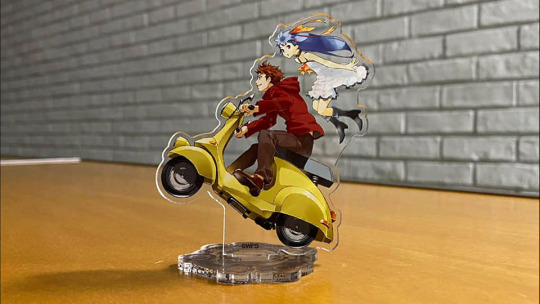
(This is not my photo, this is literally a screenshot from the game)
Watching the story continue starts to become synonymous with making the protagonists suffer, something that is made painfully evident in Yuki’s monologues.
In fact, seeing the story continue into infinity is the desire of the final antagonist, Beo, a stand-in for us god-like Observers, and someone who will go as far as to artificially manufacture conflict himself just to see how Takuya and Yuki will resolve it.
The final goal of the main story then becomes figuring out a way to end the canon story. In a way it is a fascinating critique on (the sadly too many) stories that continue way past the point they were meant to end, just for the sake of more content for an audience willing to pay.
But then, what happens when do finally get to the end?
We get a couple of lines about the world becoming peaceful…for a while. And then, it gets destroyed.
It’s not made clear exactly why it happened, but the fact the attacker is a giant invincible tarot card with Beo’s image implies this is the will of the Observers. The characters, in their last moments, lament how quickly the world can still take what little happiness they have away from them. It’s worth mentioning that ‘Shoumetsu’ literally means to disappear, or be annihilated.

If we take a Beo-like Observer’s perspective, could this be saying that a story that doesn’t continue has no value in existing?
Isn’t it kind of similar to how once canon is broken in Spiderverse, the world has no choice but to collapse on itself? Because there is no more story beyond canon for the world to support.
What actually happens to a story when it ends? The characters in the story, as well as all the events that have happened until then, the entire world, the universe contained within that story, also end, right? That seems to be what happened in Shoumetsu Toshi. And it seems to be what the other Spidermen in the Spiderverse are actively trying to avoid.
It’s an interesting conundrum. To save everyone else’s worlds, Miles basically cannot be allowed to coexist alongside them.
I am very excited to see where Spiderverse 3 takes their story. I have no doubt they will come up with a poignant and creative way to resolve the conflict. Perhaps a way for Miles to trailblaze a new story just for himself; a twist on the original canon that is just as legitimate as any other Spiderman’s story.
But while we wait for that, I want to share Shoumetsu Toshi’s answer to a very similar problem, from chapter one of its epilogue.

How Shoumetsu Toshi chose to end its story
At the start of Epilogue, Takuya and Yuki are separated. Takuya (with Yuki’s brother Souma), attempts to move forward even when nothing is left in front of him. Yuki, on the other hand, follows a voice and finds herself in a triangular room with many doors. She then has a conversation. Literally facing the fourth wall. Talking directly to us.
Yuki talks about how she’s wanted to meet us, and that she is grateful to us for always cheering her on. But also, she does not want to be the one being observed anymore. She knows the Observers want the story to continue forever, but she doesn’t want that. She invites the Observers to come with her to the end of the journey, and find their happy ending together.
At some point, the voices of the Observers become a single voice - the voice of the first Observer, Sora, who is also the creator of this story.
Sora fears the end of the story. She doesn’t want to say goodbye to the characters she loves. Yuki will disappear if the story ends and she is forgotten.
But Yuki says that won’t happen. She will always be here (just in a place you can’t see her). No longer being together doesn’t mean the past never happened. They are connected now, through the journey they have taken together.
Sora is actually afraid of being left alone. She has been using Shoumetsu Toshi as a form of escapism. But all good things must come to an end, and while continuing the story has its own value, Shoumetsu Toshi teaches us there is meaning as well in waking up from the dream and embracing the reality in front of you. That’s what it means to live.
Sora, Yuki, Takuya and Souma then open the doors to the epilogue together, embarking on one last journey to save their friends, tie up loose ends, and drive the story towards a true happy ending.
The end of canon is a gift
I want to pause for a moment here and talk about what the game creators are implying through this message. Basically, when the canon story ends, these characters and ideas don’t 'die'. A part of them remains with us, the Observers. And in a way, that means they surpass canon.
The creators want their characters to keep living on, through us, the players. And this is consistent with many other aspects of the game: from parallel worlds that serve as a convenient explanation for nonsensical April Fools situations and collaborative crossovers to exist (X X X), to their willingness to literally write a fan's OC into a canon ranking event. Heck, one of the chapters in the main story is straight up fanfiction of Takuya and Yuki, played off as a dream.
Shoumetsu Toshi is a story the creators want to share with their audience. They actively encourage fan participation to shape and add a new layer of meaning to the game, in ways both good (like 'saving' a character at a live event to enable their story to continue) and bad (audience voting killed off a different character).
Shoumesu Toshi’s main message is ultimately a love letter to future creators. This is a story they want to share with you. This is a story they want you to pass on. Canon has provided the foundation, but now the rest is in the Observer’s hands.
The characters will thank you in game, but they will live on, in the fanart, the fanfiction, the stories inspired by it, created by the Observers, the fans.
And I think this is the perfect way for a 'story' like this to ‘continue’. Canon is not everything. Canon is a gift to the imagination. The true power of canon is to inspire even greater creativity.
It is rare to see such a positive and respectful message aimed directly at the fans embedded so deeply in the identity of a game, and I really want to see these messages more often in mainstream media.
How wonderful would it be if the ending of Spiderverse touches on this message even just a little bit? Spiderman is a franchise with such a long history, spanning so many stories, so many worlds, so many different types of media, touched by the hands of so many creators, and touching the hearts of so, so many more fans. Wouldn’t it be wonderful to find a way to pay tribute to every single one of them? Regardless whether they are young or old, liked the comics or preferred the movies, a Marvel or Sony fan, diehard lore loyalist or secretly have their own Spiderman OC, whether they express their love through art, fiction, roleplay, or even just daydreams.
I just think it’d be really cool.

Sorry one more thing:
While I was going through old screenshots to research for this post, I realised the finalisation of Souma’s character arc is incredibly similar to Miles’ dilemma. Souma is the first antagonist of Shoumetsu Toshi, who goes through a redemption arc and basically joins the main character roster by the end. However, in Epilogue, he gets told over and over again by another version of himself that the plot will refuse to progress unless he sacrifices himself. That’s just how the story is meant to go.
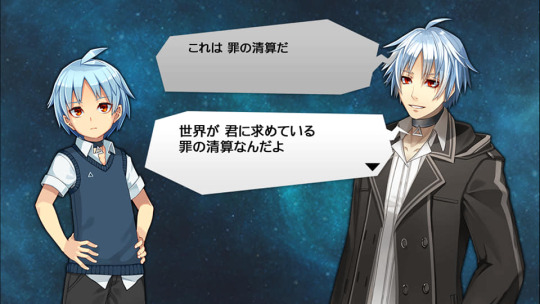
When I have time, maybe I'll write this bonus case study.
But if you want to read (a lot) more on Shoumetsu Toshi, I have summaries of the first two parts of main story here and here.
Unfortunately I haven't gotten around to writing any more story summaries yet, but for those who are curious about Epilogue, I did make a fangirl tweet when I first played it.
#analysis#comparative study#across the spiderverse#spiderman#shoumetsu toshi#essay#storytelling#canon#fandom#long post
7 notes
·
View notes
Note
Comics this week ?
Action Comics #1059 - I knew it! I knew it was the Empire of Shadows! God I’m actually excited for Batman to show up in Action, I can’t believe it. Then again this is a very different kind of Batman, and it’s an evil Batman who is being used in service to (hopefully) make Superman look good. What a refreshing concept as opposed to the all too often reverse. Otho being the one Stone targets makes sense, like “Norah” points out, she’s a killer and the youngest daughter of the family. They have some things in common. God I love all the crazy tech that Steel has built over the run. It’s been great to have him be so involved and I’m going to be really disappointed if he gets dropped again with the “Superstars” next year. Shame Sandoval can’t finish this arc but I do enjoy Barrows. Nice little bit of Metropolis history with the street name, PKJ didn’t get to do as much of that as I was hoping for, but anything that plays up Metropolis as a “city of immigrants” suits me. Looks like Constantine and Etrigan will be showing up to help Superman delve into the Dark Multiverse to find Otho. Probably will learn the backstory of this Batman next issue, maybe even learn what happened to that Earth’s Superman too. Can’t wait! The Kenan story came to a satisfying conclusion as well, Yang did a good job within the limited pages he had. Justified why Kenan joined the Superfamily and why he isn’t interacting much with the JLC anymore. Last line paired with that panel shot was a gut punch. Yang set Kenan up for some great drama if anyone bothers to follow up on it which they probably won’t. Maybe I’ll get lucky and Yang will be the fourth writer for the Superstars next year after Aaron, Williamson, and Waid.
Steelworks #6 - Thought it was a solid freshman showing from Dorn. Ending was a bit rushed but there were some nice character moments across this whole mini, even if it’s definitely not an essential read for the line. Walker made for an entertaining bad guy by being so unrepentantly evil, it's nice to have a few of those guys around amidst all the sympathetic bad guys these days. When are we going to actually see JHI and Lana tie the knot? Maybe in Action? Would like to see that actually occur, it's been good for both characters imo.
Detective Comics #1078 - I have not read the Knightfall trilogy so I’ve never been a huge Azrael guy, but damn I actually am becoming a fan. Seeing gleefully charge a werewolf head on does a lot to endear him to me.
The Flash #3 - Love what Deodato is doing with the panels, really helps to sell the disorientation that Wally and Max are going through. Cool revamp of the Folded Man, my Flash knowledge has a bunch of holes in it so I don’t know what his deal has historically been. Good use of him here that makes me want to learn more. Bit nervous about the implication that Speed Force users are screwing up reality every time they use their powers, it reminds me too much of that Venditti plot point from New 52 GL about the Emotional Spectrum “running out”. Obviously they’re not going to stop making Flash stories so either they have to “fix” that if it’s actually the issue, or it’s a misdirect.
City Boy #6 - Good ending. Pak’s got a nuanced character in Kim, he’s so human and fallible that he could easily have ended up a villain as a hero. Seeing him rise above that at the end is inspiring in the way superhero fiction aims to be but usually falls short of. I don’t know if he’ll avoid falling into Limbo, he’s not a natural fit for any team, but I’d like to see both City Boy and Pak get more play at DC.
The Penguin #4 - After this week’s issue of Tec I wasn’t sure how King’s heist story would stack up against V’s - good thing that was a feint! Penguin’s taking a lot of risks here, that whole stunt could easily have ended with him being dead, but at least King showed that Cobblepot was actually nervous and unsure of how things would play out. This could easily be a Penguingod book but it avoids that pitfall.
2 notes
·
View notes
Text
Title: Brett
Author: Michael Swanwick
Rating: 5/5 stars
I don't know whether this is my last (and best) Swanwick novel, but I read it all in one go after reading his earlier novel, "The Hall of Uselessness," and it is now firmly one of my favourite novels of all time. It has a lot going for it: a compelling story (that doesn't rely excessively on "weird" or "unbelievable" elements), richly developed characters, a truly unique setting (a far-future dystopia but without any of the usual political content of the genre), and an atmosphere of creeping dread and unease that I've never experienced in any other novel.
Swanwick has some really interesting tricks up his sleeve that he pulls off very well here -- for instance, the central conflict between the hero and the antagonist is essentially an aesthetic conflict. A lot of contemporary fiction is basically about the "inner conflict" between the human mind/soul and the world: what does the universe mean, does it ultimately make any sense, can one derive meaning from it? Swanwick takes these questions to their logical end, but presents them through the aesthetic/symbolic lens: rather than simply telling the story of human mind/soul vs. world, or of some abstract concept of Meaning vs. Chaos, he starts with a series of simple, elegant aesthetic symbols -- e.g. an array of numbers that can't be expressed in words, and then lets his characters explore the associations and implications of this system of symbols, as much of a symbolic system as the world that their actions are taken in relation to.
This is very reminiscent of Vladimir Nabokov, who also wrote some beautiful symbolic fiction, and I felt the two authors must have something to do with one another; indeed, "Brett" reads like Nabokov's version of Swanwick's story, though it was published more than a decade before Nabokov's most famous works. I've never met an author who had any direct influence on Swanwick's work, but I feel like Swanwick does the same thing Nabokov does in his books -- he uses the symbolic, the poetic, the stylistic elements of fiction to create something that feels "unbelievable" and "impossible" (yet very satisfying once one sees through the trick), but with a feeling of inevitability about it that one finds only rarely. (One might compare it to Nabokov's own description of what he does in his "art"; the idea that art always contains hints of what lies behind it, even if sometimes those hints are more subtle than one wants to admit.)
What really impressed me about this book was how beautifully it combined the kind of "epic, mythic, cosmic" narrative with the kind of "personal, emotional, everyday" narrative that one often gets in science fiction. A lot of contemporary SF tends to be one-way -- telling a story in which the world is just so big and strange that it seems impossible that people like us could ever really understand it. But Swanwick's story (and its sequels, "A Thousandth Man" and "An Alien Heat") is essentially one where the world is small, and yet no less alien for that. To find out how one can love and relate to the alien world of "Brett" -- well, you'd have to read it.
8 notes
·
View notes
Text
Rambles about the Conviction Arc Part 11
Rambles about the Conviction Arc Part 11

So when we left off, the Tower of Conviction had just collapsed on itself and turned into the Hand of God, so we all know what’s coming. But cool let’s look at it anyway.

1. This really reminds me of that scene in Devilman with the kid that ended up getting decapitated by his demon-merged parents. It’s interesting how thick on the ground the Devilman influences can be – I’ve heard there are some people who like to insist that the Go Nagai story that influenced Miura was Susano Oh instead of Devilman... but that strikes me as denial to be honest. Because they, I guess, don’t like the implication that there’s some kind of dynamic correlation between the characters in each series, or they just don’t like Griffith as much as Ryo, who knows. I looked into Susano Oh at one point to investigate where that idea came from and it really has nothing at all in common with Berserk aside from the existence of a shadowy villain cabal and the main character’s love interest being raped. It does kind of strike me as predictable that specific corners of the fandom would focus on the “evil bastards and a raped love interest that the hero has to avenge” thing though, since that’s kinda all they seem to perceive.
Anyway, that was a pointless ramble – Miura himself said it was Devilman and Violence Jack. And these scenes where the spirits or demons take over humans and the humans become violent monsters always evokes Go Nagai, not just in concept but in the visual language.
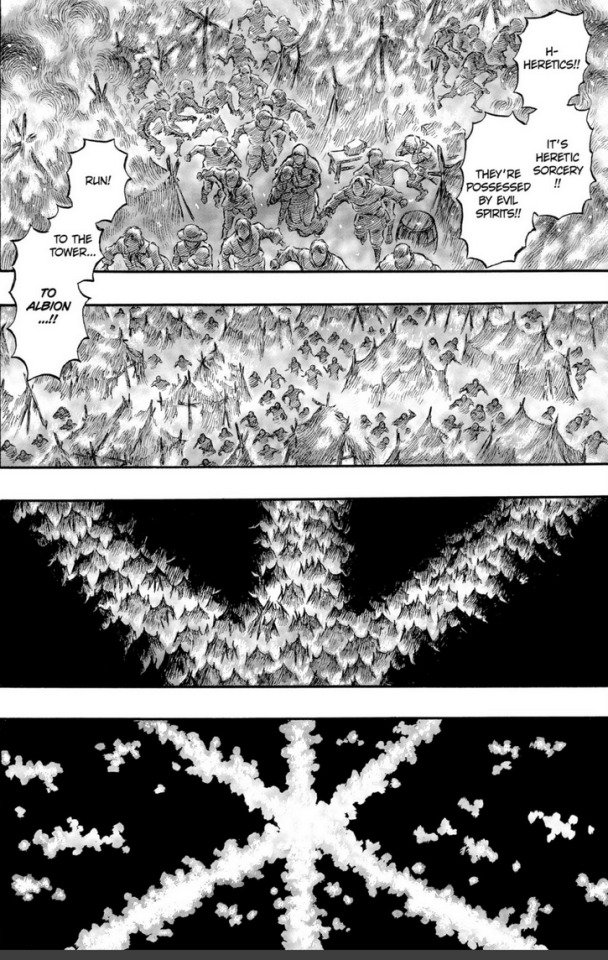




2. I left this whole sequence intact because it’s just unfair how beautifully cinematic and atmospheric it is. It plays like a film in my head, and it says everything you need to know through the panel staging – the slow pan away from the camps as they explode into madness, Guts’ dawning realization, the looming spirits in the background, and then the camera pivoting to reveal that Guts himself is right in the palm of that immense hand. Beautiful.
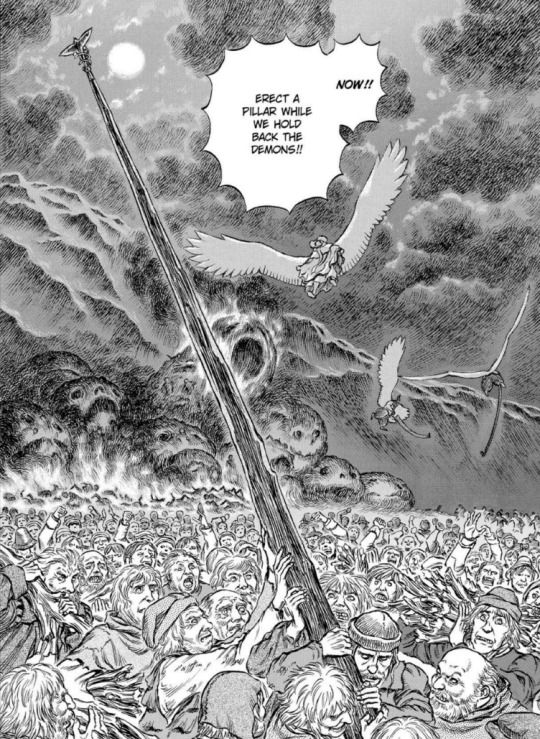
3. Like... if you try to break this situation into clean cut sides, it’s... very difficult.
Mozgus is a pseudo-apostle, and he’s trying to kill Casca. From Guts’ perspective he’s clearly a villain, which means he largely reads as one to the reader... and his penchant for torture helps with that. But at the same time, he’s also genuinely trying to protect the people from the spirit onslaught that is largely brought by Guts and Casca.
Because that’s one of the twists of the situation! He’s not wrong that Casca is the one who brought those spirits that possessed the people in the tunnel or flooded the tower. He’s not wrong that killing her would presumably dampen the attack somewhat – the movement of the world toward Griffith’s incarnation has exacerbated things, but it was the brand overlap that originally brought them. Mozgus doesn’t have the full context, obviously – he thinks Casca is actively summoning these things or that she’s commanding them rather than being the passive catalyst she is...
But I guess my question is, is that something that people who aren’t Guts should care about? If her presence is causing thousands of deaths and it can be stopped by executing her, would doing that be morally wrong? Is it better to let the destruction continue? Presumably Kant (”do not treat people as means to an end but as ends to themselves”) would think so, but Bentham (the correct action is the one that benefits the greatest number of people) would not.
I think this is the kind of thing Miura meant when he talked about trying to create Berserk without these strict enemy/ally, good/evil demarcations. They’re all doing what’s best from their own perspective, from Mozgus trying to save humanity through both cruelty and kindness to Griffith sacrificing his last remaining allies in order to retroactively justify the deaths of all his previous allies, to Guts charging forward to find Casca even knowing his brand and Casca’s together will cause chaos and tragedy, to the Behelit Apostle trying to kill one world to bring out a better one.
So like if you follow Guts’ perspective you see this crazy pseudo-apostle trying to kill a character/woman you care about but if you flip the focus, you see this crazy guy killing everything that crosses his path, burning the world down behind him and not caring as long as he gets what he personally wants.
Or, as Miura said himself, “From (Griffith’s) perspective, maybe Guts looks like the villain.”
4. So okay I’m about to track Guts’ part in this area of the story, which may require some jumping around and also a couple of sidetrips to really get it all together. First of all, this next bit really needs to be understood in the context of this page:
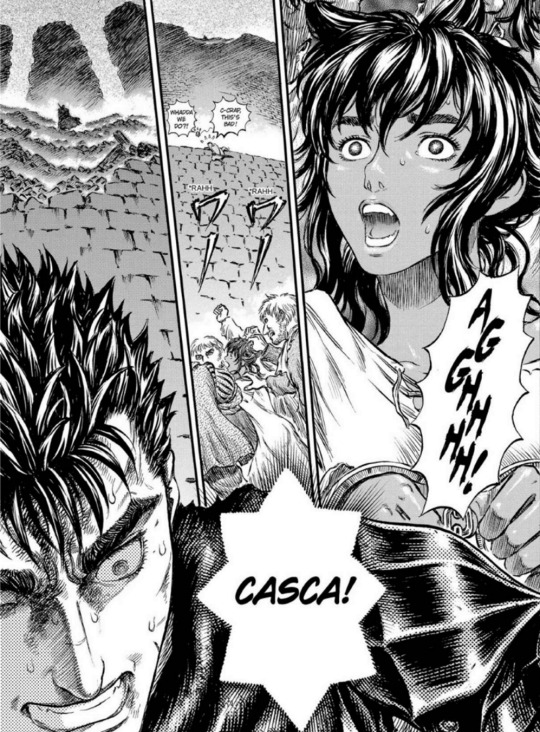
Because Guts is up there on the hand alter, and he sees Casca being led to her execution... and he’s panicked about it. Also note the position of the fingers from the hand which are currently behind him.

Here, the jelly spirits are rising from the layers of rubble between Guts and Casca, so here he’s still facing Casca.


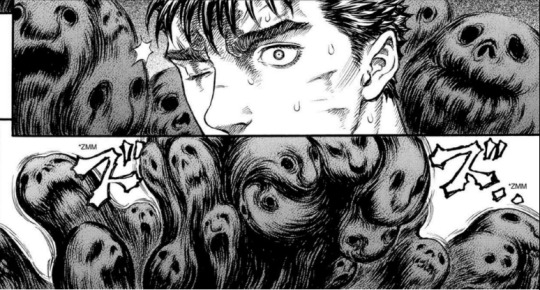
Some more come up from behind him, and some take over the bird guy’s corpse and turn it into Void.
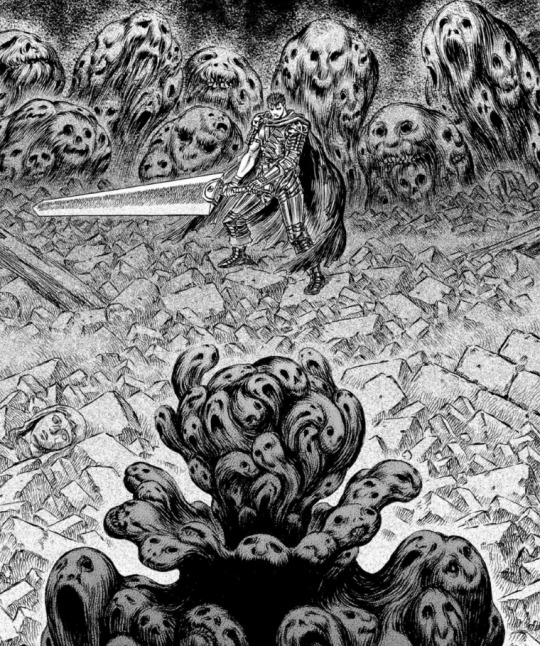
He is now facing away from Casca.
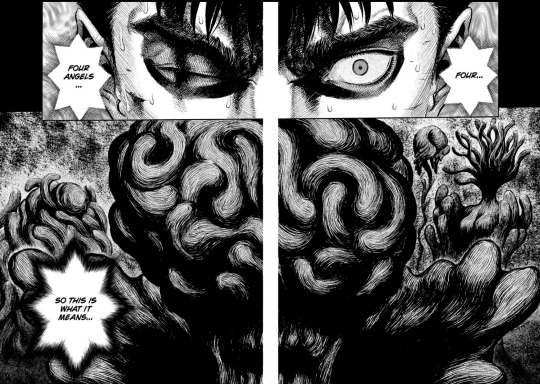

And he just kind of goes into BoD mode and starts chopping at the Godhand.
Also, I really like this image:
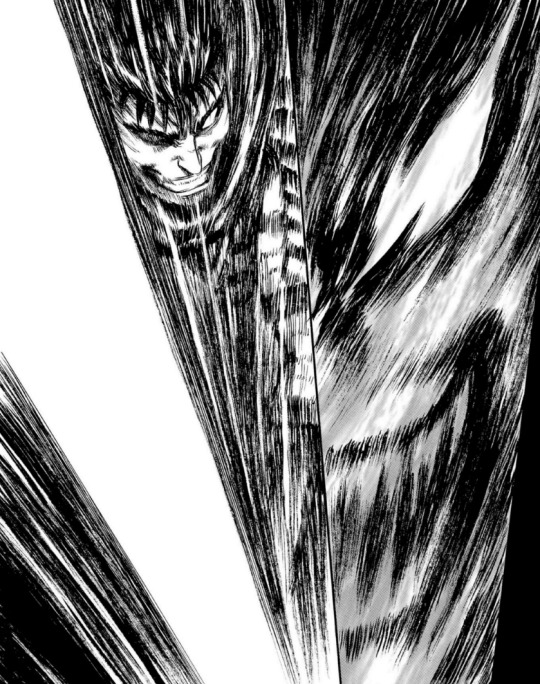
Where the extremes of Guts’ rage and his inability to contain it is represented in his face becoming half-Beast of Darkness with those...eyes and those teeth and that inhumanly extended mouth.
It also makes him look like Akira Fudo.
Anyway here he’s “chosen” between saving Casca and going after the Godhand... which is evident from how in order to attack the Godhand, he has to turn away from her. Rescue or fight? he went with fight.

However, these Godhand are just echoes, not the real things,

he thinks about Griffith, and it’s interesting how he still imagines his broken body in that incubation egg. It is, I think, sort of triggered by this recreation of the original eclipse not just in fact (like in the fact that there’s literally a recreation of the Eclipse in progress) but also in his own personal role.
Because here we are right back there: Guts in the palm of a handshaped alter with four of the godhand and not the fifth and a wall of monsters coming after him, ignoring Casca’s desperate situation because he’s too focused on his Griffith issues. Also interesting: when he thinks about Griffith he doesn’t look... angry. He looks... I don’t know. Distraught? And maybe a bit frightened.
So okay, like I said, Casca is down amongst the crowd that’s tearing at her and dragging her to a pyre to burn. Guts is very aware of this because he saw it happening before the Godhand echoes appeared and... well instead of going after her he attacked the echoes.Then...

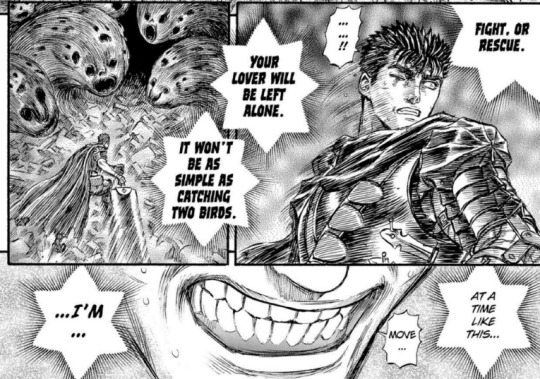
So like, he remembers that Skull Knight had warned him that he’ll have to choose between saving Casca and fighting his enemies. More than that even I think this scene is masquerading as a reminder to him but it’s just as much a reminder to the reader – it sets out the stakes. Guts has to choose. And he’s struggling with it...

...because Casca’s situation is bad. So he goes to get her....

Or does he??! Initially we can’t tell - he has jelly spirits in front of him and behind him and the visual marker of which direction hes facing (the fingers of the hand alter) aren’t shown. But then...
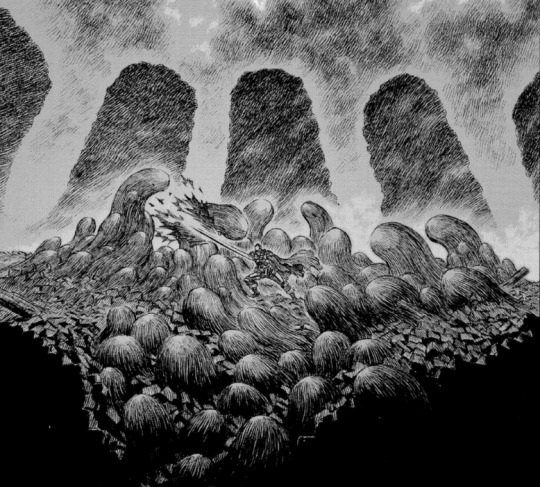
NOPE. The orienting fingers return and he isn’t. He isn’t going after her at all. because remember she’s basically beneath where the reader is sitting - opposite the fingers, and there he is not even trying to go that way.
And I mean, he’s upset about it, the fact that he’s uh, leaving Casca to burn to death does kind of weigh on him.
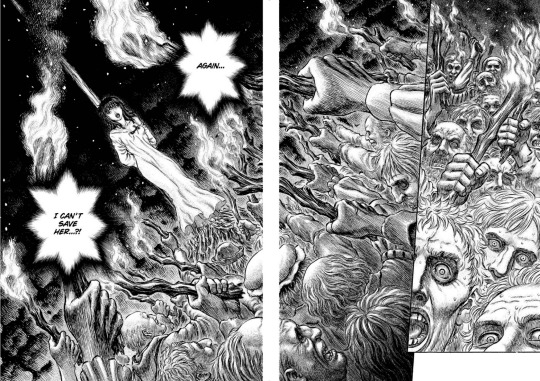
“The same... the same as that time... With the same outcome? Again I can’t save her?”
But it’s funny because he’s not even trying to do that, which maybe is appropriate since he wasn’t doing that during the Eclipse either.
Anyway, the broad movements to parallel of the Eclipse are in progress even outside the general area, because SO FAR WE HAVE
-Guts in the palm of the alter attacked by a wall of monsters, faced with the four Godhand -Casca surrounded by a mob she can’t protect herself from trying to brutalize and kill her. -and Guts uh just not even trying to find her. -Oh yeah plus there’s always...
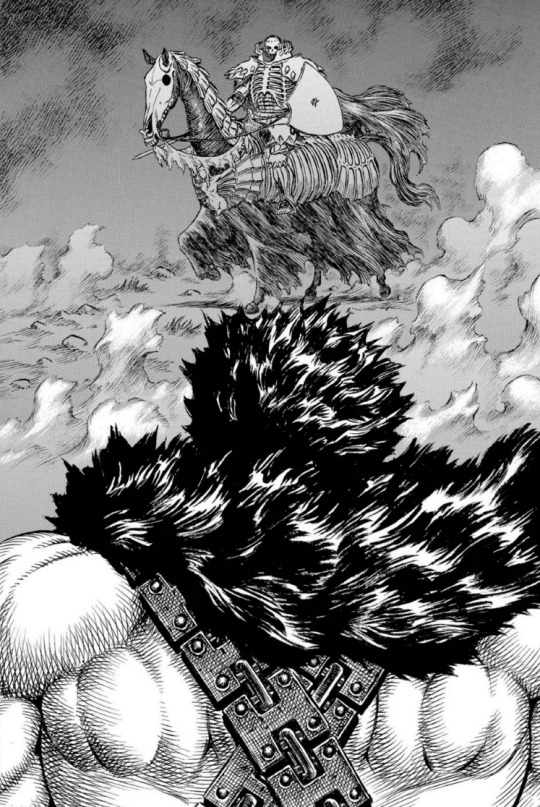
Skull Knight and Zodd meeting outside the sacrificial site.
Anyway so, Casca’s on the stake, Guts is smashing jelly spirits instead of going after her, meanwhile his future companions are kinda nyucking around trying to figure out what to do with themselves, like...
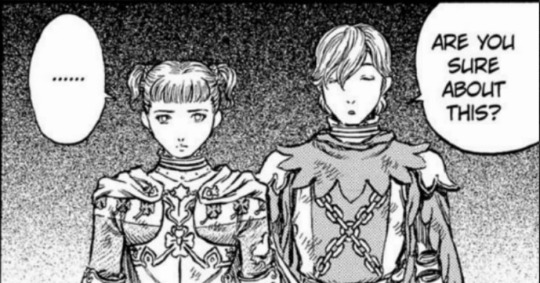
And... this is such a glorious headtrip. Miura juxtaposes Guts’ battle and Casca’s mortal peril.
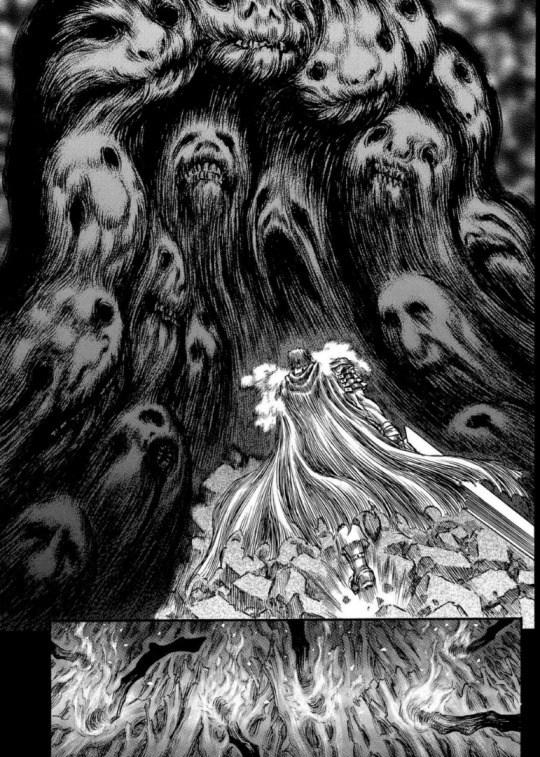
Guts vs. the jelly spirits. Casca vs. the fire. I tend to think we’re meant to be expecting him to change his mind at the last second, realizing that saving her is more important and deciding to abandon fighting and go after her. The storytelling choices emphasize that question - she’s about to start burning, he’s running at spirits, she looks up, and the reader I suppose is meant to expect to see Guts barrelling down at her, but...

NOPE 2.0!
It’s not Guts at all that that’s about to come jumping down at her, it’s Isidro.



Incredible.
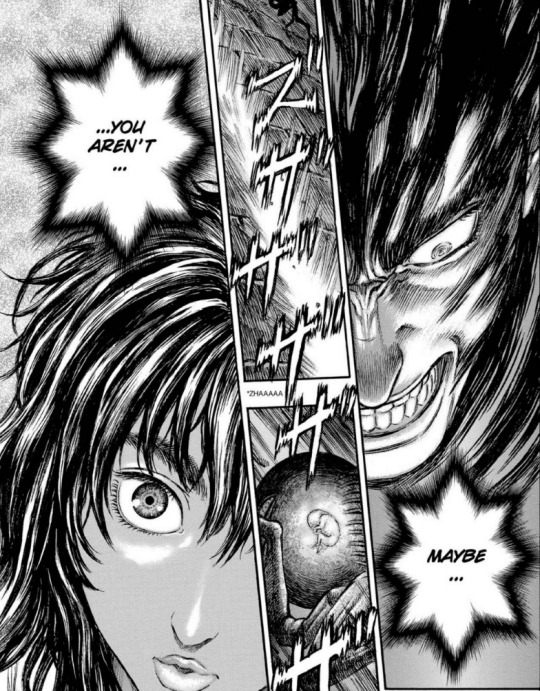
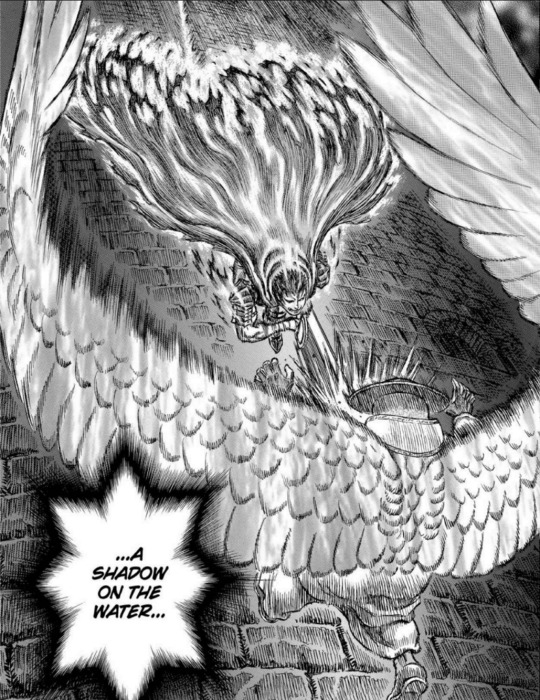
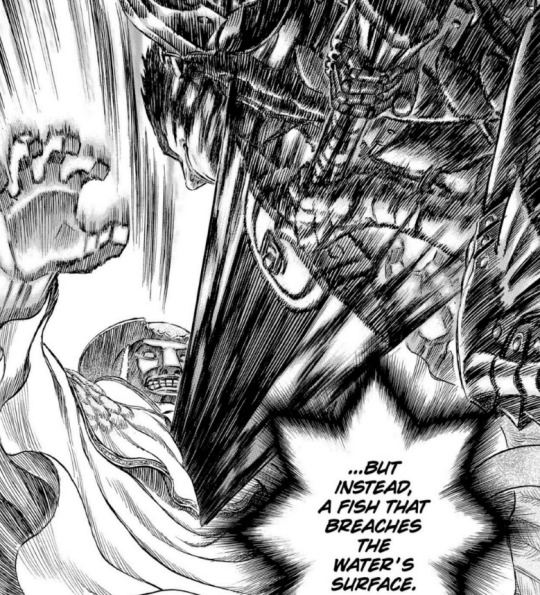
Anyway once Casca is in the vicinity of something he can stab, he does end up helping her situation. The narration makes it clear that Guts is remembering that Skull Knight had said this time might turn out differently - that Guts might be able to change something instead of just reacting to what Fate throws at him.
Now, I’ll be honest, this is wild to me - it’s wild enough that II have a hard time believing that "Guts literally chose to fight jelly spirits and let Casca burn to death” is what I’m meant to take away from this sequence. Because if Griffith were up there, sure no problem, but jelly spirits? I assume it’s based in that moment where he gets an anxiety/distress/fear moment thinking about/wondering about where Griffith is - like he doesn’t want to get down from the hand alter because he expects Griffith to turn up or even just thinks maybe he will (especially since Skull Knight did basically say Grifith would be returning to the world).... And it does fit the ultimatum Skull Knight set up, and that sure does seem to be what the staging is implying. And the way the sequence is presented does appear to be trying to make you think he’s going to save her and then throwing you for a loop by revealing he isn’t, he’s up there hacking at spirits instead.
But it’s still mindboggling and I really struggle with thinking that’s what actually happened, asldas but, you know, there it is.
Anyway as far as the Eclipse parallels go regarding Casca, I would argue that the murderous human masses parallel the apostles, while Mozgus is a bit of a standin for Griffith – as I’ve talked about before, his nature and his relationship with his followers strongly parallels the portrayal of Griffith’s role in the story despite being, obviously, much smaller scale and with a sillier portrayal at times. Also he is the force behind her being attacked to begin with.
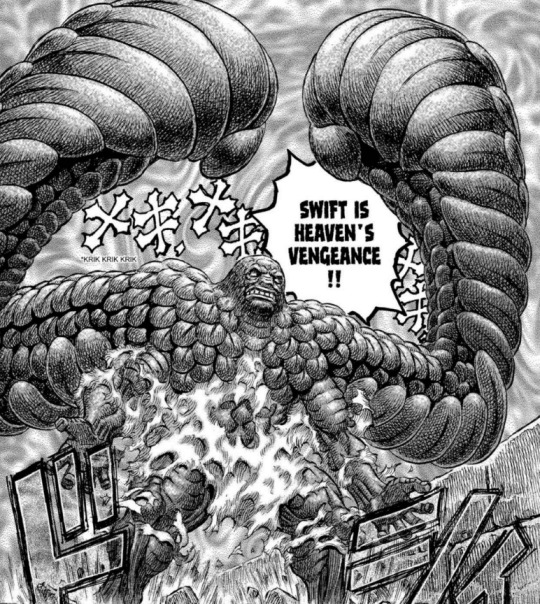
5. Mozgus’s monster form is kind of silly. I mean, I guess it’s supposed to be, rofl. But it’s genuinely bizarre around this time, and seeing him cry tears of blood over his disciples is kind of..... I wish I found it more touching but I mostly find it ridiculous. Sorry Miura. Not really though, because he obviously meant Mozgus to be a little absurd.


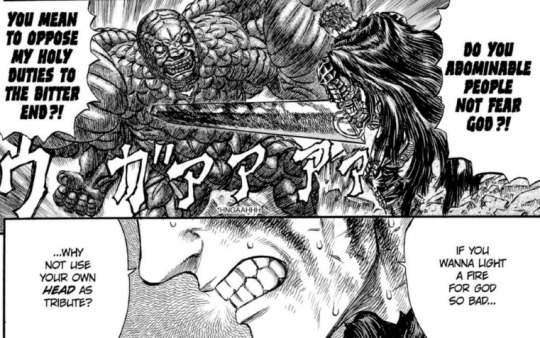
Truly Messiah material.
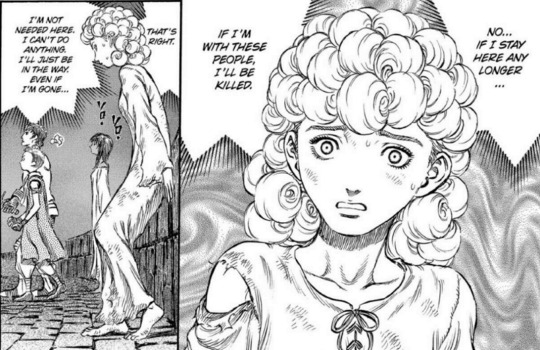
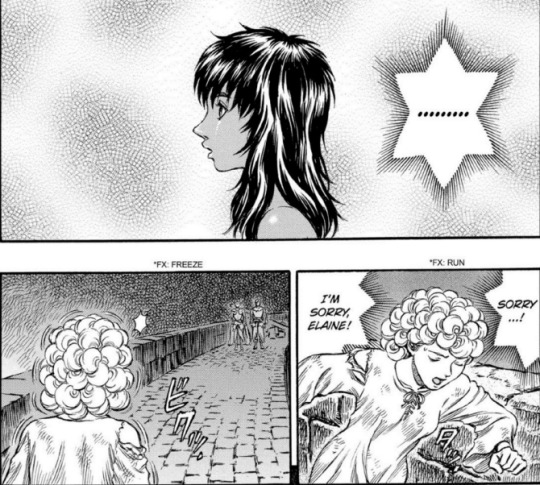
6. Gah. There aren’t a lot of characters I really dislike, honestly like I can think of maybe three offhand. I’m sure there are more, but generally I either like a character or don’t care about them either way. Nina.... I don’t find her quite as grating as I did, say, Dolores Umbridge back in the day. But it’s not THAT far off.

7. So okay for a hot second I’m going to ignore how absurd Mozgus looks and think about this scene. I got into a conversation with @zombiesgohome recently, where we were talking about the way Berserk portrays “great” or “natural born leaders.” Miura really tended to go all in on that campfire thing, right, like Griffith was the greatest inferno and so everyone sought his heat and his light.
This is the case for most of the people we’re intended to see as great (not good but great) leaders. They are basically people that others cling to for light and stability, even if and when they resent the way that leader reflects their own weakness back at them. It kind of echoes back to Griffith’s monologue back in his very first appearance way back in Volume 3 – that there is a handful of individuals who, regardless of the status they’re born into, are ultimately the few who will truly shape the world.
This I think is true on various different scales - obviously Griffith turns out to be the greatest and biggest of the special world-shapers, but there are others who have a similar impact on a smaller scale. Luca was the same way to the prostitutes she protected – she didn’t change the whole world, but she changed theirs. Guts was like that for the Raiders, and later is the same way for the companions he ends up traveling with.
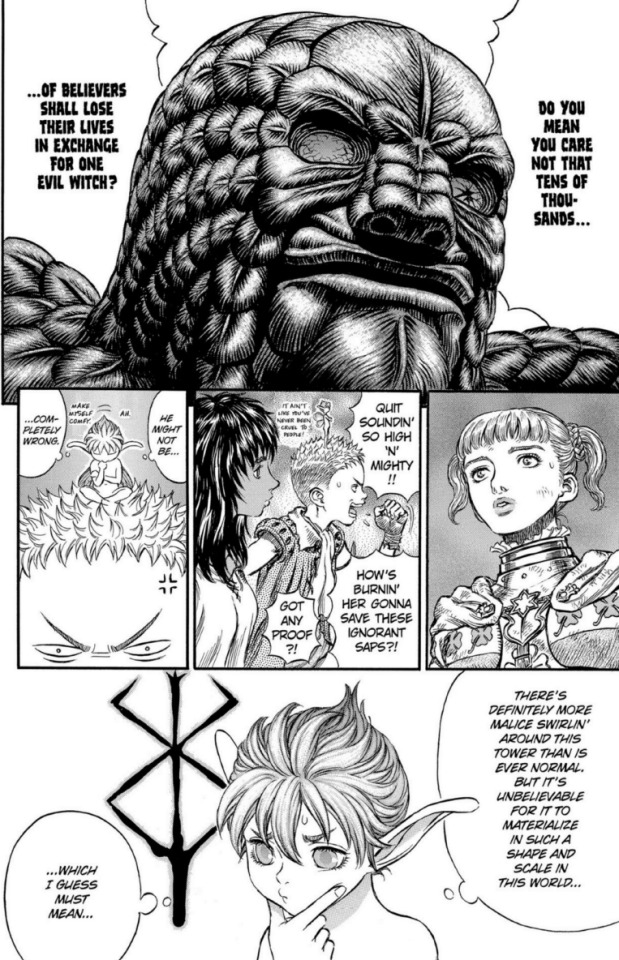
Mozgus is unironically one of those people. The way he gathered those disciples, and the way the terrified refugees cling to the hope that he can save them, the ease with which they accept that he’s been transfigured into an angel, tell us that. I mean there are leaders of every morality, after all, and Mozgus is..... more ambiguous than one would immediately think.
Because I mean, again, he’s not wrong. The monsters are there because Casca and Guts are there. By any I guess utilitarian perspective obviously she has to go, I mean you could say throw her out of the area instead of actually burning her alive but either way its not like the attacks will stop if she’s still there. And in theory if you kick her out you’re just passing the problem to the next person.
To be clear I’m not saying yeah burn Casca, I’m just saying it’s another perspective issue – does the weight of many lives override the right for one person to live?
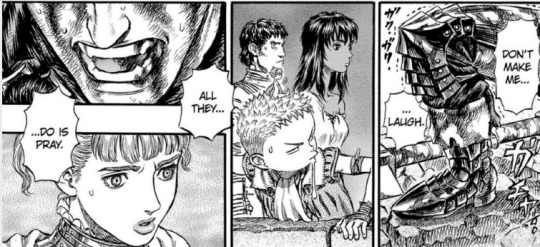
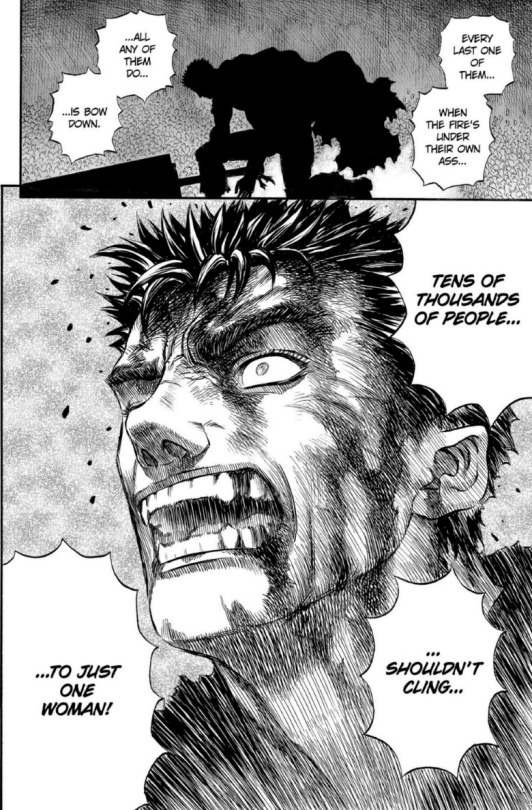
8. And this is brings to mind two main thoughts.
First, it’s a direct confrontation of the question of Guts’ morality. I always say that he and Griffith aren’t really different in moral quality just in their specific priorities – Guts always thinks about his ingroup and is absolutely ready to sacrifice the larger picture. He is, after all, the individual. Griffith always thinks about the larger picture and is able to sacrifice his ingroup, because he is a representative of the collective – the weight of 1,000 lives is greater than the weight of 100. This – among other things - is how Griffith arrived at the idea that sacrificing a few dozen or a few hundred men at most was, while awful, not as bad as wasting the lives of the thousands that went before them.
But Guts is the opposite – he’d burn the world down to protect the handful of people he really cares about and I guess my question is, how is that better? Is it better? I don’t know that there is a legitimate answer, certainly not one presented in berserk – people assume Guts is “right” because his priorities are more in alignment with their own and, I think more than anything else just because he’s the protagonist and we’re used to the protagonist having the “right” perspective especially when they aren’t overtly villainous – Gut isn’t Light Yagami or anything, you know? He’s a guy doing his best. Plus I think a normal person finds it harder to understand choosing a principle over the individuals who are specifically important to them. But it doesn’t change the fact that his choices aren’t inherently more correct than the opposite thing would be.
That was a bit of a ramble but I guess my point is... allowing thousands of people to die so he can get his ex-girlfriend back isn’t really morally superior to allowing dozens or hundreds to die so that Griffith could achieve the dream they all dedicated their lives to. And for the record I’m also not saying that what Griffith did was morally correct, I’m just saying they’re both making decisions that I think make sense to them but are, I guess, arguably asshole moves. It just depends on which worldview the reader is closer to.
And I guess more than anything I’m saying I think both of them are morally ambiguous and that their morality level is not dissimilar, it’s the specific priorities that are different. Because the eclipse was awful...
But is this actually better?
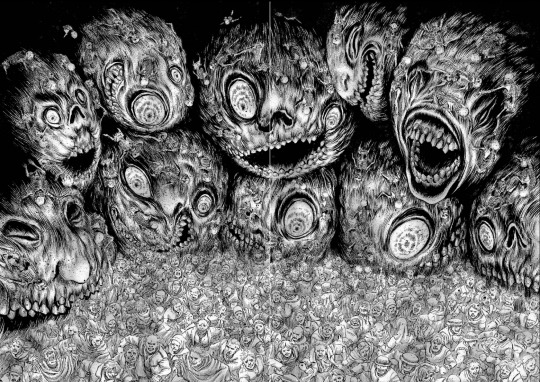
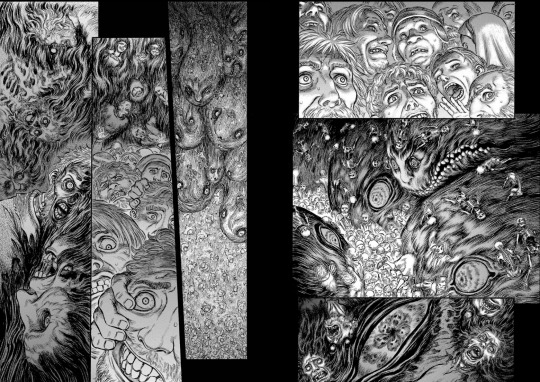

I guess the argument would be “he’s doing it for Casca and Griffith did it for himself,” but really he’s doing it for himself (because he doesn’t want to lose his last connection to the Hawks) and Griffith was doing it for the (dead) Hawks as well as himself, so I D K. You could argue that it’s a passive decision with Guts (let it happen) instead of an active one with Griffith (do the thing), but passivity is a choice too.
The second thought: his comment here is, while obviously about Casca, also one of those moments that reflects the lessons he took away from the Band of the Hawk – the echoes of the Campfire, or the Promrose speech telling him that people have to find their own path and not cling to someone else.
But I mean, thinking like that is what makes him one of those leaders.
So like... Griffith.



9. There has been some discussion about the specific relationship of the infant to Griffith – is the body Griffith is in literally just the infant’s body or is the infant’s body part of the materials used to create Griffith’s body or what.
So like initially I figured that he was literally just in the baby’s body – there’s no strong indication that there’s anything other than the infant’s body involved, and the way the original baby is positioned in the center of the behelit apostle and Griffith’s infant form is in the same place really. But looking at what the behelit apostle is saying it does seem as though he’s taking the “world” in and incorporating it all, as well as himself, into that body. And later Griffith describes it as the infant being “fused into” his “vessel.”
So I’m going to say it’s part of the materials but maybe something more like the materials become part of the baby and change it accordingly, since I do feel like the framing implies that the infant is the or at least a major component of what becomes Griffith.
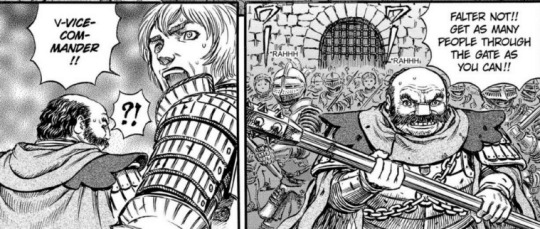
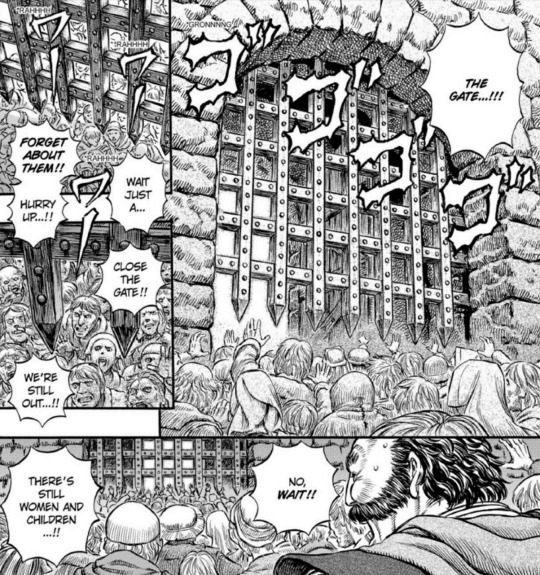

10. This is a pretty good time to note that I really like Azan. He’s a good egg.
Honestly the Conviction Arc in general is full of interesting side characters at least to me. Nina is even a pretty interesting character in the way her psychology is constructed even though I can’t stand her. Which by the way is my way of saying I’m skipping more of her making my hair stand on end.
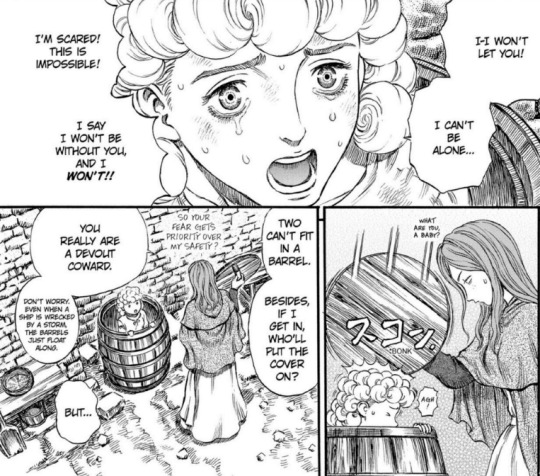
Luca’s like, “what are you, a baby?” and I’m just like, yeah clearly. I don’t know, man. Also this makes me wonder if I was too nice to her back when she ran off with Casca, because at the time I thought she was sympathizing with Casca but now I’m like, maybe she literally just didn’t want to be alone.
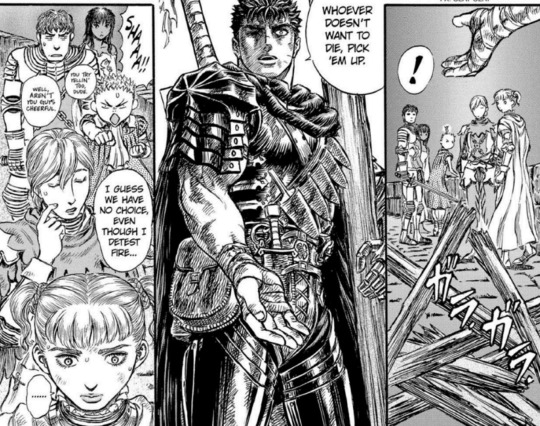

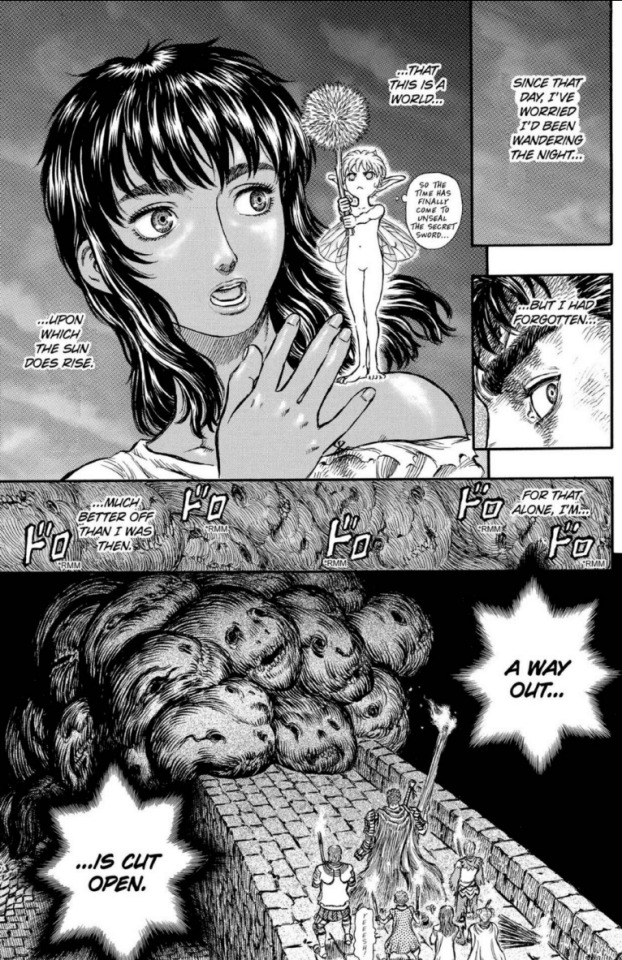
11. I’m not going to talk at any length about how this scene is the signal that Farnese’s path is rerouting to Guts or how it signals her ultimate feelings for him – it’s the Griffith in the field throwing Casca a sword moment, that’s obvious. And Guts parallels Griffith’s actions in that scene too – he doesn’t just save Farnese, he gives her the means to save herself.
But that’s not the thing that really stands out to me about this scene. What really gets me is how this reinforces all those things I talked about in the last Conviction Rambles and then here again – the fire, the way leaders carry their own flame and people gather around them just kind of naturally. Because everyone naturally just falls into line behind him – Farnese even notes that in this situation most people can only cling to something and he doesn’t. Most people, in other words, are Hawks, are Nina, are Mozgus’s disciples – they cling to something when the terror starts, or when times become difficult. It’s all they know how to do. But Guts, like Luca (who is doing it just a page or so back), becomes the thing that is clung to instead. Becomes the torch in the dark and in fact....

It’s not even subtle imagery, he’s literally holding the fire that lights everyone’s way.
Miura mentioned in those tweets from before that Guts would eventually become more like Griffith, and well...
All that said there’s a certain irony to it since...

Again, he and Casca are the ones creating this situation to begin with. But since I keep banging on about parallels between him and Griffith, I will note that this is another similarity between Guts and post-Eclipse Griffith at least. They create the situations that they save others from.

12. And I admit this one did kind of get to me. The culmination of Nina’s terrified arc – the moment she finds the spark she needs to keep going... but also honestly, the reality that she’s dying anyway – the behelit apostle even mentions that she doesn’t have very long left – but she still wants to keep going as long as she can. In the end, that’s what drives her pettiness and meanness and cowardliness, isn’t it? The fact that she has so little time, so she wants to cling to what she has left.

13. You know.... I think I mentioned this before, but Guts himself (and Casca) are largely responsible for Griffith’s having returned, right like.... it’s the overlap of their brands that created the chaos and drew the jelly spirits that then consumed everything and gave rise to Neo Griffith.
I just think that’s interesting in a way, because Griffith – the original Griffith – made them who they are (in both good and bad ways)... and then they made him who he is, too. Not just by enabling his reincarnation this way either – obviously his body is at least partially composed of their demonspawn.
It also brings back the question of free will, though. Because if no one could change that Griffith was destined to return, does that mean that Guts choosing to go after Casca in defiance of fate was part of the plan? Doesn’t that also mean that Guts’ choice to kill Mozgus, thus saving Casca and himself, is part of it as well since if they had died, the jelly spirits would have disappeared?
You can go pretty far down the rabbit hole with this. There’s a theory that Femto’s rape of Casca was done to create the demonchild to become his host, and my thought on that is kind of the same as my thought on Guts having sort of accidentally destroyed this area by going after Casca, namely....
I don’t think that’s what was in Femto’s head when he did it – I think he really did it to hurt Guts – but that may well be why it happened on a Tapestry of Fate type of level. Because a lot of things in Berserk kind of move on the planned (by IoE presumably) overlap of desire and need – arranging for someone who would want to do something to be where it needs to be done at the time it needs to be done.
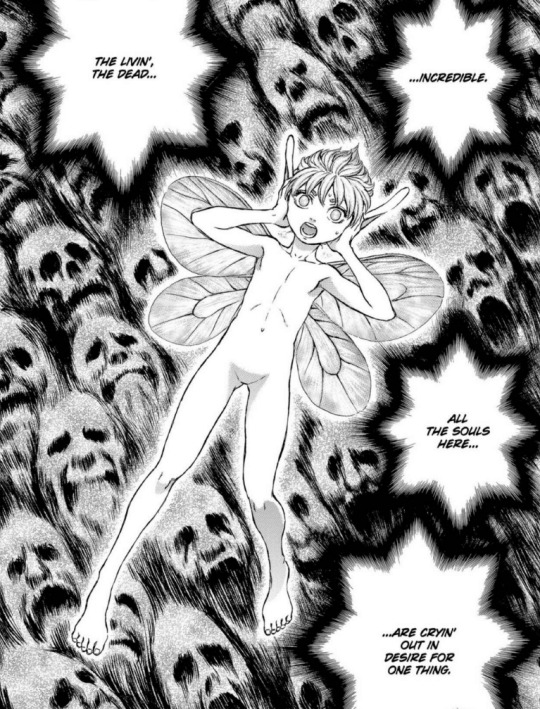
14. I kind of appreciate the confirmation from someone who isn’t involved with the Godhand, to be honest. The idea that damned or hurting souls call to Griffith for salvation reminds me very much of the tiny demons that came to him in the torture chamber.
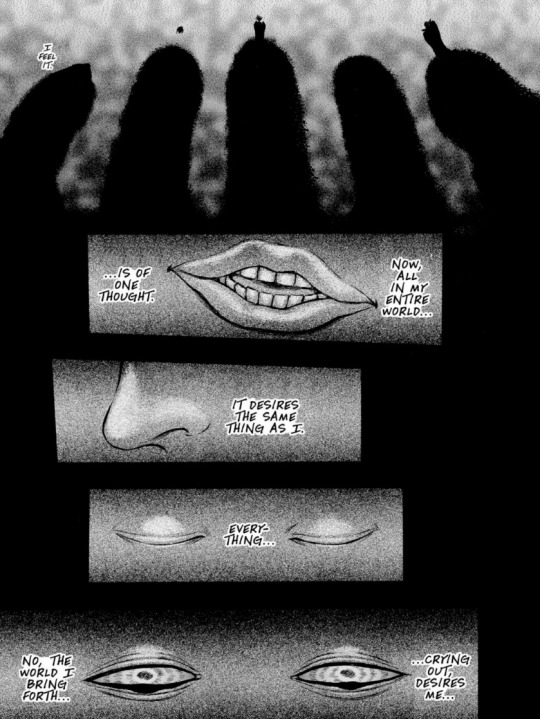
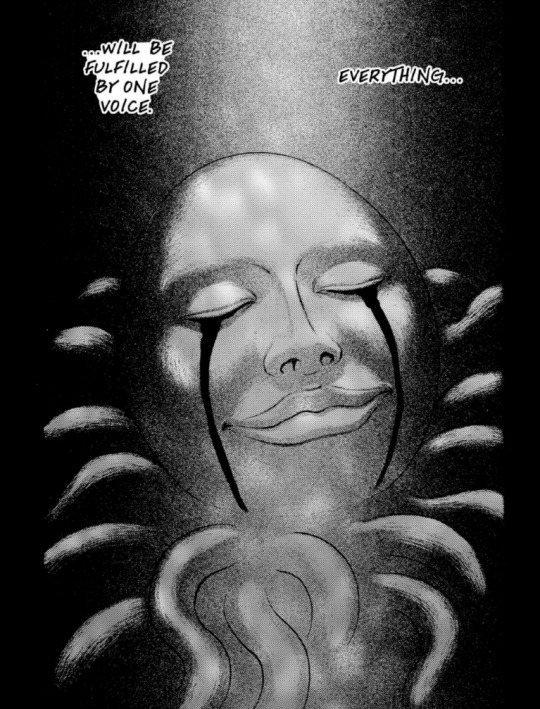
15. You know... it’s not like I don’t understand why people see all this and think EVIL EVIL EVIL right, like we have jelly spirits devouring humans and demons and all that.
But the souls that call for him – the jelly spirits and the living, the demons in the dungeon... they aren’t really portrayed as evil – they’re in pain. They’re tormented by the pain and anger they experienced in life. They destroy things because of that pain. They aren’t calling for someone to come and destroy everything, they’re calling for someone to save them.
That’s not to say I think Griffith is a paragon savior, I just think there’s a lot of complexity behind human nature in Berserk that people don’t always like to acknowledge.... and of course complexity in Griffith’s role as that humanity’s voice.
And I’m stealing a line from @zombiesgohome here, but.... there’s some poetry in the will of manking having been executed by this behelit apostle – a person with no identity of his own, who is constantly around but never seen or acknowledged.

And since behelits are apparently souls, it makes sense that they, too, call out in their way.
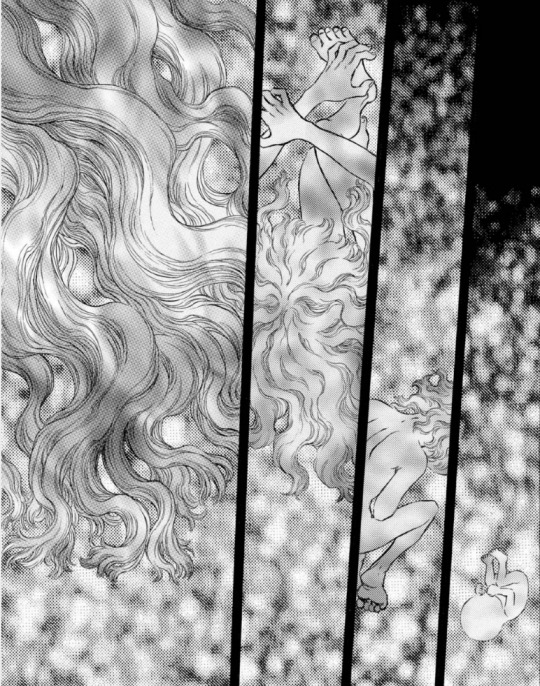
I wonder what it was like reading Berserk as it was released and turning a page to see that.
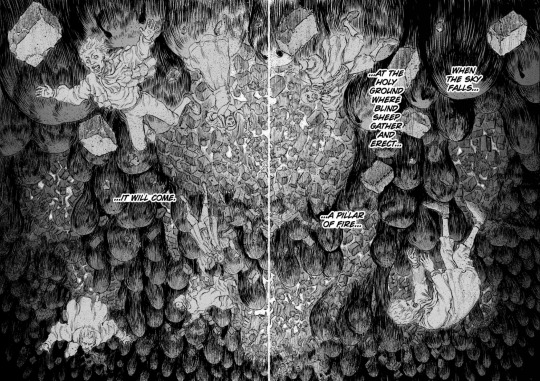
16. So...prophecy check. Going back to the revelation sent by Griffith a few volumes ago, we had a few things unchecked:
-corpses of both family and neighbor- I feel like they covered this pretty thoroughly in the refugee camp if nothing else.
-mobs of starving vagrant folk – Also covered by the refugee camp
-a sun obscured by black smoke – Well, notably everything is dark and smoky now, but as soon as the pseudo-eclipse ends, the daylight comes out, so there you go. It’s now.
Three down, along with the biggest one, which is fulfilled with the great hand collapses and drops the corpses of the entire damn area around the tower of rebirth on top of everyone.
17. Well, now some short comments on the cleanup chapters.

The reemergence of the light is also great imagery for the emergency of Griffith in his “human” form from the shadow of Femto, his “dark” form.

Again, I ship it, gdi. In fact, I’m just gonna say it:

We should’ve kept Jerome instead of Magnifico.
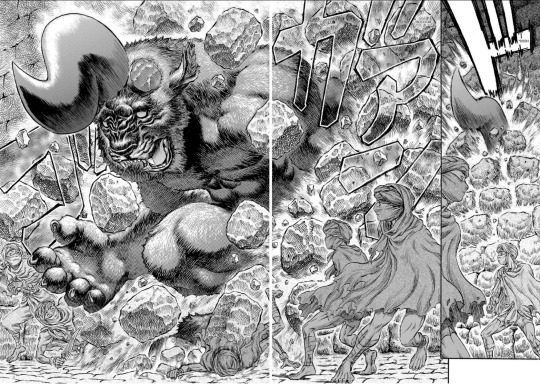
Zodd is one of those characters whose appearance means the plot is turning, especially if he turns up somewhere without Griffith in his hand.

But also...
Reactions like this serve to remind me that the world as a whole doesn’t know about Apostles yet, you know? We’re 20 volumes into the story so it can be easy to lose track of who does and doesn’t know about what... but really the answer is that no one knows anything except Guts and those he comes into contact with. Because the world isn’t generally overrun with supernatural stuff at this point – it just stirs up when Guts or Casca are around.
And now we have at last arrived at...

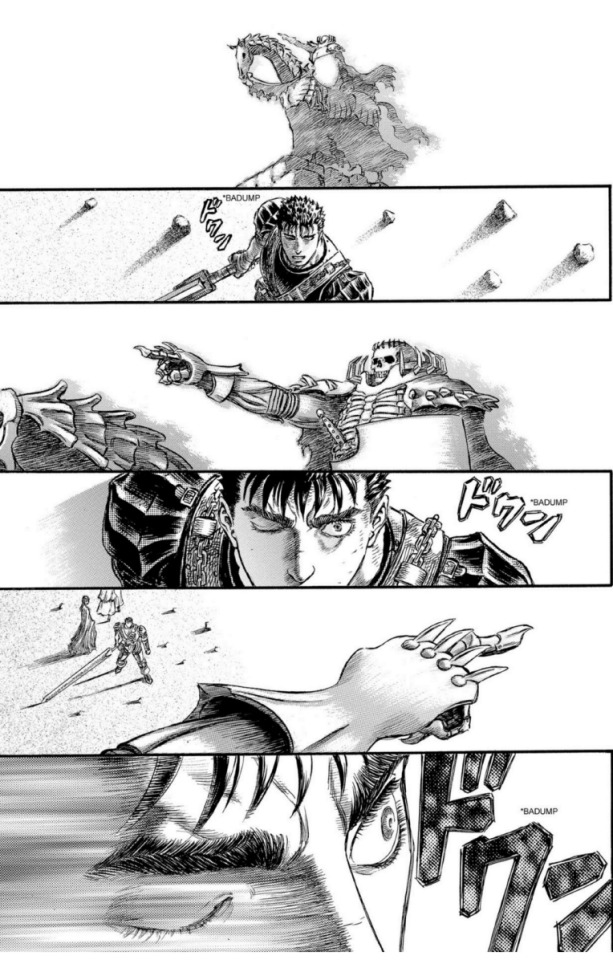
...and I’ll leave off there for now. Buy my merch! (I don’t have any merch).
12 notes
·
View notes
Text
ACOTAR THINK PIECE: ELAIN ARCHERON, UNTOUCHABLE
*DISCLAIMER*
This will be a long post.
Please take the time to read this post in its entirety and truly reflect on the message I am trying to send before commenting. My goal is to use my background in Gender and Women’s Studies to deconstruct the comments I have seen on Tumblr and Twitter and bring awareness to the ACOTAR fandom.
The reason I am tagging “Elriel” in this post is to call attention to the arguments in the Elriel fandom that: weaponize Elain’s femalehood to shame real life people for their opinions about Elain’s character and her relationship with Lucien; victimize Elain’s character in fandom discussions; and coddle Elain’s character, which limits fandom discussions about her narrative development and prevents the ACOTAR fandom from holding Elain accountable for her actions and inactions in the same way that the fandom holds other characters accountable for their actions and inactions. It is for these reasons that I WILL NOT remove the “Elriel” tag from this post because all of the above points contribute to the toxic discourse surrounding Elain’s character.
I urge those who use these arguments to understand their implications, why they are problematic, regardless of intent, and reexamine their contributions to the ACOTAR fandom. I WILL NOT tolerate anyone who tries to twist my words and say I am attacking people and their personal shipping preferences. In fact, I AM CRITIQUING THE ARGUMENTS THEMSELVES NOT THE PEOPLE USING THE ARGUMENTS.
Also, I highly encourage the Elriel fandom to read this post because it addresses how the concept of choice as an argument enables arguments to exploit social justice and feminist languge in order to vilify Elucien shippers, among other problematic things.
Elain Archeron is one of the most polarizing characters in the ACOTAR fandom. Though opinions about Elain vary, arguments in the Elriel fandom cite society’s perception of traditional female characters in comparison to non-traditional female characters as the reason behind the hate, and this belief is used to provide an explanation as to why other characters in the series are favored over her. In the series, Elain is portrayed in a wholly positive light and this image carries over into the Elriel fandom, painting her character as a good and kind female who has been unfairly wronged and a victim of circumstances that were out of her control. When arguments in the Elriel fandom oppose other viewpoints in the fandom, they fall into one of three categories:
Category 1: Weaponize Elain’s femalehood to shame real life people for their opinions
Maybe people who hate Elain are just jealous of her in a weird way similar to when someone hates the pretty, nice, and charming girl in school just because she is too perfect
Disliking Elain is misogynistic
What happened to feminism? What happened to women supporting women? What happened to she can say no? All of that disappears the second you force Elain to be with Lucien
Elain antis are misogynistic
All Eluciens are Elain antis
Antis claiming they’re feminists when in reality they hate on Elain and Feyre but love Nesta
Elain antis are such sore losers. Y’all were that bunch of people who could not get over being rejected from hanging out with the cool kids so y’all are projecting your hatred towards pretty people now to get validation
I don’t get how Elain’s love for gardening equals boring for some people. I’m sorry your misogyny finds traditionally feminine activities boring
Why are you attacking a female? What did Elain do? Where are your feminist voices?
The fandom is misogynistic towards Elain
If people loved Elain they would ship Elriel
If you hate Elain it says a lot about your feelings toward women
If you hate Elain because she has no “development” then you must hate Azriel because otherwise you’re misogynistic
Eluciens are turned off by the idea of a woman that has the autonomy to reject a man for the simple reason that it is her choice
Eluciens are all about feminism and “it’s HER choice” until it comes down to females not wanting a male
Eluciens don’t respect Elain’s feelings when they ship her with someone that was part of her trauma and makes her feel uncomfortable
The way some Elucien shippers completely disregard how uncomfortable Elain is around Lucien is so hilariously not funny. Prioritizing being mates over Elain’s feelings is just regressive
It’s hard as a fan of Elain to see someone ship her with a person who makes her physically uncomfortable to be around. Wouldn’t you want both characters to be happy to be around each other
Imagine if SJM saw all the awful things her “stans” had to say about Elain
It’s true that we know comparatively little about her, but is she really boring or do you just not value stereotypically feminine traits?
So y’all are just gonna tell me you prefer Elucien over Elriel? Even though Lucien treats Elain as if she’s something that belongs to him? The only reason he wants to be with her is because she’s his mate, he doesn’t respect her, doesn’t treat her as his equal, even though that’s what mates should be? He doesn’t bother to look past what’s on the outside to see her for who she is. And Elain is obviously repulsed by the idea that she should belong to anyone or have no choice in who she can be with. Azriel is her friend and the only person who sees her quiet strength. He has so much faith in her, in her abilities; he’s the one who kept her company when no one else did, he’s the only one who bothered to see her for more than her brokenness. You’re going to tell me you still prefer Elucien over Elriel?
The more I see Gwynriels that ship Elucien out of their hate for Elain, the less I can understand Elain stans that ship Elucien. Pls Elain has made it very clear that she doesn’t want Lucien, why would you ship her with him? Do you hate her too? Smh
The real question would be, if you care and understand Elain why would you ship her with Lucien (where she canonically shrinks when he is near)?
People crying over Helion and Lucien’s mom not getting to be with each other and her being forced into a relationship she didn’t want, but also ship Elucien? Just say you hate Elain
When Elain’s book is out, Gwyn stans will look like clowns and I will laugh because they set her up by shipping her with Azriel just because they hate Elain. Watch them play the victims now because Elriels are clapping back the hate they’ve sent towards Elain
As romantic as wanting girl who is visibly uncomfortable around a guy who caused her trauma to end up with the said guy. Guess their standards for romance are in hell
Category 2: Victimize Elain’s character
Gwynriels only want Gwyn with Azriel because they despise Elain
Gwyn stans and Gwynriels are Elain antis
No one in the books dislike Elain, so why are there so many people who do?
Elain hasn’t done anything wrong or questionable to warrant the hate she gets
Not having Elain’s POV makes it easy for people to be swayed a certain way about her character if you already don’t relate to her in some way
It’s been years since this series came out and we haven’t gotten a lick of an Elain POV, but people still hate her for what? We don’t know her thoughts, dreams, or aspirations
We haven’t even had Elain’s perspective yet and people are passing these judgments off on her
Elain antis who say she’s boring are just cruel when she has obvious symptoms of PTSD like Feyre and Nesta
Gwyn is one of the most overhyped characters and that’s only because most people hate Elain and they couldn’t wait to find a random girl to ship Azriel with
Nesta was abusive to her sisters but Elain (who has only ever been kind) is painted as the villain
From the text we know that Elain is the epitome of feminine stereotypes (gentle, gardening, baking, non confrontational for the most part). Yet people still call her boring or deny that she has any interesting character traits?
You can’t love Nesta and hate Elain
People hate Elain because of internalized misogyny and lack of taste. All the girl does is tend to her garden and mind her business and they treat her worse than Tamlin
Does Gwyn deserve all this support? Of course yes! She is amazing! But where’s that support when Elain was in the same situation as she? Where’s that support for her right now? Why do they idolize Gwyn for her interactions with Azriel and hate Elain for having any interaction with him?
It’s not even a ship war anymore, they just hate Elain
People hate Elain for no reason
Some of y’all don’t like feminine traits and it shows
We know less about Eris and Helion but people don’t call them boring. Why would rejecting femininity make Elain more interesting?
Elain has had a lot forced upon her
The main reason I believe most people love Gwyn so much is to get Azriel away from Elain. It’s not a secret that Elain has been a widely hated character for years so suddenly we get a new female who has a minimal amount of interactions with Azriel and BOOM. New ship that once again doesn’t make sense (just like Azriel x Emerie after ACOFAS)
Elain hasn’t done something so terrible for her to get this hate. At this point some of you are just being misogynistic and you don’t want to accept it. Don’t call yourselves feminists and then say bs like this, it’s embarrassing. She’s pretty and everyone agreed to hate on her
Just a personal feeling, but I feel like a lot of the Elain hate stems from internalized misogyny. That to be a strong female lead, you need to pick up a sword and fight. That to be strong, you need to adapt traditionally masculine traits
Elain is feminine. She is beautiful. She loves to bake and garden. She is docile, quiet, observant, and a people-pleaser. All traditionally feminine traits. Yet for some reason, she’s like the worst in these people’s eyes?
I think also maybe a lot of people can’t relate to her femininity? That her being so beautiful and quiet doesn’t allow for the people who dislike her not to self-insert? Most of the hate stems from people not wanting Elain to be with Azriel. It’s mean, but maybe the people who hate Elain literally just can’t self-insert if they have a story and that’s why they’re vehemently against it?
Poor Elain. The Cauldron dealt her a bad deal. Upon emerging as Fae, she is immediately declared by Lucien as his mate, never mind that she was already engaged to a prick. Her love life is not good
It blows my mind how they really think that they can compare all the shit that Elain gets with some dumb jokes about Gwyn on Twitter (and yes, the “hate” towards her started mostly because Elriels are clapping back, it was bound to happen)
I would think of it as anti-feminist with Elain and Lucien because she has consistently stated that she does not want him so if she was forced to embrace the bond that would be taking away her right to have a choice but with Az she feels comfortable around so if they were mates then Elain would be happy and feel safe which again should be the priority for women to feel safe in their relationships with anything and to not be forced into any type of situation aka the mating bond in this
Category 3: Coddle Elain’s character
Elain has value the way she is, in all her domestic girly glory. Not every character has to be badass
We don’t speak of Elain’s flaws frequently because everyone else already speaks badly of her, mainly in an unfair way
There is definitely something deeper going on with Elain but by no means will she ever be evil or any less feminine. That goes against everything we already know about her
It’s ok to critique Elain because she needs growth but y’all keep forgetting the shit her and her sisters went through
The last “bad” thing Elain did in ACOTAR was not help Feyre when they were impoverished and I’m tired of people acting like she’s a terrible character when it was their father’s responsibility. It happened 4 books ago and Feyre has forgiven both Nesta and Elain
Elain’s character and the evil Elain theory are a great example of the trend where people only consider female characters interesting if they reject femininity
We don’t know enough to hate Elain
Many people want Elain to turn evil (which in my opinion seems to come from a place of internalized misogyny)
However we don’t tend to talk about her faults, at least not publicly, as that has been, and still is, done to death, and I--personally, at least--find it much more fun to theorise about potentially interesting aspects of the overall plot, than dwell on negatives
And ultimately, I would be shocked if Elain has a more karmically-charged story than Nesta, considering that Elain’s “wrongs” are so much less severe and bad than Nesta’s, and Elain has already apologized for them (or paid the price in other ways, like through what Graysen did)
I guess I also think Elain has suffered and been punished enough. I hope her story is about finding hope in terrible situations, and learning to love her new life, and choosing her own path after everything that has been done to her. I don’t think she needs to be punished anymore or face any additional trauma
Also, why is she being judged on her decisions as a human at all? Fae are monsters to humans! They enslaved them for thousands of years, and the Wall was erected to keep them out
Like I’m sorry, but think Elain would want to leave her ONLY FAMILY AND FRIENDS for the Spring Court where she has no one because--oh look, lots of flowers!--is the craziest thing I have ever heard
Her sisters are in the Night Court. Her nephew is in the Night Court. Her closest friends (Nuala and Cerridwen) are in the Night Court. Her love interest is in the Night Court. Her extended family is in the Night Court. Her home is in the Night Court
SJM isn’t going to keep two sisters together and split up the third. Especially not keep Feyre and Nesta together and separate Elain. They were either all going to end up in separate places, or together. Not 2 here and 1 there
Compared to the other female characters in the series, Elain is the only character whose femalehood is at the center of conversations; this is because arguments in the Elriel fandom fixate on it when discussing her character. While Elain, Feyre, Nesta, and Mor are all representations of white womanhood and white beauty, Elain epitomizes the most fragile version of white womanhood. It’s easy to blame society’s perception of traditional female characters in comparison to non-traditional female characters when it comes to the discourse surrounding Elain’s character because it: falls in line with the fixation on Elain’s femalehood to silence opposing viewpoints; is a simplistic explanation that fails to tackle the underlying issues with Elain as a character, the same issues that are downplayed in-universe; absolves Elain of her wrongdoings; prevents the ACOTAR fandom from holding Elain accountable for her actions and inactions within the series; and diminishes the impact Elain’s actions and inactions have on those around her. It’s not that Elain is hated in the fandom because she’s a traditional female character; it’s the fact that arguments in the Elriel fandom deflect a critical analysis of Elain’s character because she’s a traditional female character who embodies the ideal white woman in need of protection. White fans and white-aligned fans of color, especially white women, have a tendency to vehemently defend, gatekeep, and coddle white female characters in fandom; this makes it difficult for other fans to engage in critical discussions about these white female characters because they’re viewed as flawless and all around perfect characters despite evidence to the contrary. Since Elain is viewed positively by the other characters in the series, it has rendered her character untouchable to any perceived slight or criticism in fandom discussions because those negative opinions challenge what has been said about her character thus far. And as a result, her character has been placed on a pedestal and implicitly hailed as the epitome of white womanhood; and when she’s criticized, it’s seen as a direct attack against white womanhood. Arguments in the Elriel fandom: exploit feminist language and perpetuate white feminist tactics under the guise of defending Elain’s character; center Elain in conversations about female oppression in the ACOTAR world and uphold white feminist ideologies in their critique of ACOTAR’s patriarchal society; and use the fragile white woman narrative to victimize Elain in Lucien’s presence, playing into racial biases that are associated with white supremacy’s defense of white womanhood.
Feminism is a social movement that seeks to promote equality and equity to all genders, and feminists work toward eradicating gender disparities on a macro-level, in addition to challenging gender biases on a micro-level. As feminism became more mainstream, a flat and oversimplified version of feminism emerged: mainstream feminism. The mainstream feminist movement is meant to represent all women, but rarely does it center conversations around issues that concern most women. The problem with mainstream feminism is that it’s just a popularized version of white feminism. White feminism has relied extensively on an individualized understanding of women’s oppression, exclusively from the lens of privileged white women. White feminism only focuses on the oppression experienced by white, able-bodied, affluent, educated, cishet women; and it views gender as the key mode of privileged white women’s oppression, isolated from the privileges granted by their other social identities. White women can be and are oppressed under the patriarchy but only because they are women; their identity as women does not exempt them from the privileges granted by their whiteness. The term white feminist does not mean any feminist who is white, but refers to feminists who prioritize the concerns of privileged white women as though they are representative of all women. However, the term is not exclusive to white people. Because white feminism is so pervasive, people of other racial and ethnic backgrounds often buy into white feminism, believing that if they work hard enough, they may be able to reap its rewards.
Just like white feminism, mainstream feminism only recognizes the identity of being a woman, assumes that all women share common experiences of gender oppression, fails to address other social identities in relation to overlapping systems of oppression, and disregards privilege in relation to various social identities. Just like white feminism, mainstream feminism is palatable because it doesn’t seek to challenge the systems in place, instead its goal is to succeed within them. Essentially, mainstream feminism and white feminism are extensions of performative feminism. Performative feminism is a type of performative activism that’s used to describe feminist views that are surface level and solely for the benefit of one type of person. It’s a pretense which often has nothing to do with genuine activism. Arguments in the Elriel fandom normalize and promote performative feminism because the topic of feminism is only referenced when discussing Elain. This indicates that these arguments are engaging in disingenuous discourse to push a personal agenda within the ACOTAR fandom, and it becomes more apparent when they use white feminist tactics to shut down opposing viewpoints:
White feminists weaponize and exploit feminist language to silence the opinions of other women, especially when they’re called out for their problematic behaviors
White feminists use the phrase “Women supporting women” to defend other white feminists who exhibit problematic behaviors instead of holding them accountable
White feminists weaponize phrases like “Women supporting women” and “You just hate women” to attack other women who disagree with them on any given topic
White feminists use phrases like “All women face challenges” and “Stop pitting women against each other” to sidestep conversations about privilege
White feminists divert conversations away from privilege and towards the Trauma Olympics to equate their struggles to the oppression of marginalized people
White feminists skirt around the realities of other forms of oppression and discrimination, downplaying the experiences of marginalized people
White feminists diminish or ignore the ways in which gender oppression affects other marginalized people
White feminists paint those they harmed as aggressive, mean, or divisive when confronted with the ways they have harmed a marginalized group
White feminists deflect criticism by focusing on the anger or emotions being expressed rather than the issue that is being discussed, invalidating the concerns of marginalized people
White feminists speak over marginalized voices in an attempt to sound “woke”
White feminists get defensive and insist there’s no way they could be a part of the problem because of what they’ve done to help marginalized groups already
White feminists say they don’t see color in an attempt to obscure racial issues that need to be addressed
White feminists center and victimize themselves in conversations about racism, which derails necessary conversations from taking place
White feminists who are white weaponize the intersectionality of their race and gender to avoid accountability
Feminism is not meant to be approached from an individualistic perspective nor is it only about addressing the experiences of privileged white women, it involves addressing the intersections of race, class, gender, sexuality, (dis)ability, and other social identities as well; and it involves addressing how these social identities relate to privilege. Moreover, feminism is not about women upholding complete loyalty to other women because of a shared gender identity, and to claim that it does implies that women should be held to different emotional standards than men. If men are able to dislike and criticize other individual men, real or fictional, without their characters being compromised, why aren’t women granted that same privilege?
It’s clear that SJM set up the ACOTAR world to mirror a patriarchal society, and that the imbalance of power between males and females stems from sexism. Arguments in the Elriel fandom analyze the ACOTAR world through a feminist lens to show how ACOTAR’s patriarchal society, to which the mating bond is innately tied, contributes to female oppression and limits their agency. When choice and free will are emphasized as part of Elain’s arc, they imply that Elain, through the mating bond, experiences female oppression under ACOTAR’s patriarchal society because of her identity as a female with that identity being the focal point of her oppression in the world. Elain is one of the most privileged characters in the ACOTAR world: she’s High Fae; she’s the sister of the High Lord and High Lady of the Night Court, which gives her access to wealth and political influence because of that connection; she’s able-bodied; she was magically blessed by the Cauldron; and she lives in Velaris, a place that grants females autonomy and power because of the beliefs of Rhysand and Feyre. Arguments in the Elriel fandom trivialize female oppression in the ACOTAR world because they disregard the fact that Elain’s privileges prevent her from experiencing female oppression in the same way that other marginalized females in the world do. The mating bond being one such example because those around Elain are not forcing the bond on her, instead they’re allowing Elain to reach a decision about the bond for herself; a privilege that other marginalized females in the world probably wouldn’t have. Just because Elain has endured hardships in her life and is a female in a patriarchal society, they do not erase the privileges she holds within the ACOTAR world. The failure to include Elain’s privileges in discussions about Elain being a female in a patriarchal society feeds into white feminist ideologies because white feminism operates from a very narrow perspective; it doesn’t take other intersecting identities into account when it examines gender oppression, leaving no room for discussions about privilege (or lack thereof) in relation to those intersecting identities. When discussing oppression in hierarchical societies, it’s imperative that privilege is also included in the conversation because privilege and oppression are not mutually exclusive; they equally affect the ways in which people navigate those societies through their social identities.
Rather than attributing Elain’s uncomfortability to her new life as a Fae female or the mating bond itself and her trauma to the Cauldron, the King of Hybern, or Ianthe, they’re placed on Lucien to cast his character in a negative light. Moreover, fandom discussions portray Lucien as a possessive character to further emphasize Elain’s discomfort despite the inaccuracy of this characterization in canon. Arguments in the Elriel fandom play into racial biases when it comes to Lucien (a male character of color) because they mischaracterize his character in order to victimize Elain (a white female character), placing her character in the role of the white damsel in distress. In Western society, the concept of womanhood has been conceptualized from a Eurocentric perspective with femininity and feminine attributes favoring white women. It’s the idea that a certain type of femininity is only inherent to white women as they are seen as the embodiment of an ideal womanhood. White womanhood has been a symbol of innocence and purity, and white women have been viewed as fragile beings in need of protection. The reason white womanhood functions within white supremacy is because it’s the same idea that has motivated white men to kill and beat black and brown men. The so-called protection of white women has been used as a justification for the horrific violence committed by white men because black and brown men were stereotyped as aggressive and seen as a threat to the virtue of white women. The white damsel in distress trope considered white women as worthy of protection because of their perceived innocence and purity; women of color were not granted that same treatment because they did not fit into the ideal image of womanhood. Over the years, this trope became a means for white women to exercise limited power in a patriarchal society with white women weaponizing their status as the damsel much to the detriment of black and brown men. It’s through the white damsel in distress trope that white supremacy sustains its dominance in Western society. The misrepresentation of characters of color in fandom, the dismissal of their importance to the overall story, and using them as tools in arguments centered around white characters are the foundation of fandom racism; they’re examples of how racism moves silently in fandom spaces. Instead of examining their behavior and taking constructive criticism from fans of color, white fans will often double down on their bigotry and center their uncomfortability in the conversation when confronted with their complicity in fandom racism. White fans expect fans of color to swallow fandom racism in its many forms in order to not ruin the experience of fandom, dismissing the fact that racism is prevalent in nearly every aspect of society. This mentality ensures that no one is held accountable for the harm they caused and alienates fans of color in fandom spaces.
To reiterate what I mentioned in my first think piece: terms like “oppression”, “the right to choose”, “feminist”, “feminism”, “anti-feminist”, “anti-feminism”, “internalized misogyny”, “misogyny”, “misogynist”, “sexist”, “sexism”, “racist”, “racism”, “classist”, “classism”, “discrimination”, and “patriarchy” are all used in specific ways to draw attention to the plight of marginalized people and challenge those who deny the existence of systems of oppression. Yet these words and their meanings can be twisted to attack, exclude, and invalidate people with differing opinions on any given topic. When social justice and feminist terms are thrown around antagonistically and carelessly to push a personal agenda, it becomes clear that these terms are being used to engage in disingenuous discourse and pursue personal validation rather than being used out of any deep-seated conviction to dismantle systemic oppression. Being an ally, activist, or feminist is not an identity, it’s a practice. It requires: ongoing self-reflection; holding ourselves accountable; listening to marginalized people; educating ourselves; dismantling implicit biases; challenging those around us who are exhibiting problematic behaviors; and action behind our words.
It’s important to be aware of the language that is used within the fandom when defending or critiquing characters and ships. It’s also important to question how an argument is framed and why it’s framed the way that it is to critically examine the intent behind that argument: is it used as a tool to push a personal agenda that reinforces problematic behaviors, or is it used as an opportunity to share, learn, enlighten, and educate?
-----------
Tagging: @spell-cleavers @bookofmirth @m0bulidae @ilya-boltagon
337 notes
·
View notes
Note
Hi, I've followed you for a long time and I really have been appreciating & identifying with your response to the internet explosion about Cas & Dean, so I thought maybe you could help me? I'm also autistic and I'm REALLY confused why everyone has been saying "Destiel is canon" when Dean hasn't responded yet & all we have so far is Cas' confession? I know I can be literal, but that's not mutual yet? I don't understand. No worries if you can't reply, thanks for your time either way. 💜
hello, dear! i get how that’s confusing, but the key thing here is it openly, tacitly acknowledges the concept of romance between dean and cas.
for years, it’s been implied if not outright said that we, destiel shippers, are delusional for seeing dean and cas’s relationship as romantic. we’ve been shamed and mocked and told that we’re stupid for ~making it gay~ when they’re just good friends. all this time, we’ve been ridiculed for seeing what “isn’t there”.
then cas looked dean in the eye and said “i love you” in a way that not even the straightest straight can misconstrue as platonic. therefore, after a decade of hints and implications and snide remarks (like mockingly calling cas dean’s “boyfriend”, “the one in the dirty trenchcoat who’s in love with you”), it is no longer subtext. it is canonically textual that there is romance in this relationship.
yes, okay, dean hasn’t reciprocated yet, but it’s there, hanging between them, said out loud. no longer lingering looks or ambiguous statements like “i need you” or “i love you, i love all of you.” cas is in love with dean.
it is spoken, acknowledged, and in fact blessed by the narrative, because being in love with dean is what granted cas true happiness. with two episodes left, the peak of castiel’s character arc is not only accepting that he’s in love with dean, it’s in being unashamed of it, happy with it. after 11 years of cas visibly struggling with depression and emptiness and feeling directionless, he finds his meaning, his happiness, in confessing his love to dean.
and all of that means that we were right. when we said that invisibly watching a man raking leaves isn’t a bromance, when cas broke free of mind control, when dean asked “what broke the connection?” and cas said “i don’t know” and we screamed at the tv “YOU!!! YOU BROKE THE CONNECTION, BECAUSE I LOVE YOU!” we were fucking right.
all of this wasn’t just good friends, we weren’t making it up, we weren’t ~making it gay~, because NEWSFLASH ASSHOLE, IT WAS GAY THE ENTIRE FUCKING TIME.
now, one might say, aren’t we technically only half right, since dean loving cas hasn’t been textually confirmed?
sure, maybe. but with “i love you” dropped like a bomb between dean and cas, it reframes everything that’s ever happened between them. we look back at all of cas’s actions to and for dean, everything he’s ever said to dean, every time he’s looked at dean, and realized that he was in love all along. then, what we automatically do next, is look at dean, all his actions and words and looks, and ask ourselves... wait, was he in love with cas the whole time too?
that’s the question that the audience automatically asks, to fill the empty space left by dean not having the time to react or say anything in response. without dean’s answer, we look for an answer ourselves. the audience asks this question, and therefore the show will have to give an answer. desperately we want to know, does dean love cas back???
and what can be the answer? with every extraordinary thing they’ve ever done for each other, with half those extraordinary things textually confirmed as romantic, with dean sitting on the floor crying his eyes out, there is no other possible answer but yes. and furthermore, we want the answer to be yes. we naturally yearn for dean to find cas, save cas, and tell him “i love you too,” when we might not have been lead into that yearning for reciprocity if he had said it back immediately.
an audience that hasn’t shipped destiel all along might have balked at both of them saying i love you “out of nowhere”, but this play of events can cause even a casual viewer who never before interpreted dean and cas as romantic to shout at their tv “of course dean loves cas back!! he has to find cas and tell him!!” suddenly, even a casual viewer wants canon destiel.
so what does that mean? that means the longtime destiel shipper sits back and says,

1K notes
·
View notes
Text
I found a way to reread Guardians of Ga'Hoole for free and I'm being blasted with memories of how much I enjoyed this as a middle schooler. On top of that, having the critical lense of an adult is changing the subtext and making things I missed when I was younger more apparent.
It's definitely not the most complex on a technical language scale, but in terms of storytelling it really has immersed me back in this unique world with these interesting characters, and even if written "simply" to be comprehensible to the younger demographic, it still carries the weigh of all the mature events with its chest and doesn't shy away from the dark and morbid by hiding behind mere implications which I appreciate.
It doesn't shy away from narrative violence, both cruel and justified, it's not afraid to explore fascist idealogies and how those cannot be solved with mere debate or civility, and how they target others and spread. The violence isn't spectacle, it's tragedy.
There's a lot to be said in terms of the story sometimes contradicting itself, though, and I do want to acknowledge that I find the Owl Supremacy over other birds in dialogue to be really distasteful and adjacent to racism in a way that contradicts the supposed noble intent of the protagonists and company, because I do find it a bit jarring that while fighting the tyto supremacist Pure Ones to prove all owls are equals, they will simultaneously discriminate and behave in derogatory manner to many non-owls so casually.
I'm also not fond of the nestmaid snakes feeling they're "meant" to be servants to owls as an entire race and while I love Mrs. P, I find her reinforcement of owl supremacy over other birds to be more than annoying narratively speaking. I feel that the symbiosis between blind snakes and owls could have been framed in a less....outright classist/racist adjacent way, and I find the blind snakes attitude toward their owl rulers to be disturbingly compliant to subjugation and servitude.
They could be proud of humble work without this mess of contradictory implications, but that's a topic that I feel I can't speak on too much being a white person when it comes to an issue adjacent to narrative racism since I can't draw from any experiences. I can draw from my experiences as a lower class person though and the classism itself is very much alive in that aspect of the narrative.
These gripes aside I'm really still in love with this world, the concept of a post apocalyptic recovered world where nature has reclaimed the ruins of humanity and the species left behind in our wake are becoming the vestiges of future development and new wisdom on an Earth devoid of humanity is an incredible idea.
I'm still very early into my reread but I'm in anticipation of completing the series again. As much as I have my issues with it, I appreciate that violence isn't inherently abhorrent and that the narrative justifies violence in the name of saving others from cruelty and fascism while also encouraging strategic approaches and using a balance of brain and brawn to take down a vast threat.
What's struck me most (so far) was rereading the Capture, seeing how Soren and Gylfie witness such horror at St Aggie's, and how the place spreads its terror by breaking the individuality of each subject, and by denying knowledge and forbidding questions. Denying their very identity, wiping away all freedom, and convincing them to ignore their very biology and instinctive truth using this breaking of spirit and mind. It's incredibly reminiscent of real world genocides and fascist movements in a way that I find surprisingly accurate for a story about sentient civilized owls.
Reacquainting myself with Soren and Gylfie's escape highlighted the importance of individuality, self assurance, and wits. I find this refreshing, that the story condones justified violence while not glorifying it over the top and making a spectacle of it for the sheer sake of shock and horror, while still maintaining a narrative that imposes the utmost importance of logic, problem solving, ethical deception, and critical thinking skills in the matter of anti-fascist action. It doesn't hide the grim reality of the situation, but it also focuses more on how it effects the characters emotionally than it does the "glory" of battle, from what I glean, and that's nice.
There's some of the typical fantasy "glory and honor of battle" type themes don't get me wrong, but it's not the center of it and the story promotes that battle should be in the name of Good and saving others, not to elevate oneself to a position of power through sheer brutality, and that I very much enjoy.
#guardians of gahoole#guardians of ga'hoole#GoG#gahoole#legend of the guardians#kathryn lasky#reread#nostalgia trip#animal fiction#xenofiction#xenofantasy
187 notes
·
View notes
Text
Thank you for this discussion! I've been losing my mind over this and I was surprised to see no one bring this topic up.
I fully agree with everything you have said, and the sudden time travel sort of plot suddenly being a thing and sorted out in one chapter made me lose it I'm not gonna lie. The terrible implication that the present is what it is because of Yona's connection with Hiryuu in the past and that he didn't end the dragons only because of it...and how Yona doesn't think about it a single second is crazy. Like I'm genuinely shocked by this. I really wish we had seen her hesitate too, or that the story would have developed the conflict of "should we change the past if we have the possibility and if it can save many, but we would also lose what we cherish in the present?" or something along those lines like many other stories do in this situation. But akayona is always impredictible like that, isn't it? It often touches concepts and developments with the most potential you have ever seen in your life to actually go in a completely different direction instead. I can't help but being a bit amused by it.
And I get it from Yona's point of view. After all, the dragons are her present. Their meeting already happened, she doesn't want to erase that (and just like for Zeno, whose right it is but the dragons themselves to decide if they want to be erased or not? Even if I feel for Zeno, who knew that anyway the others wouldn't have made any change and he had to do something even against their will) and that's fair. She loves them, she wants to fix things not in the past, behind her, but head on. But...Like pointed out it's not really adressed like that and it's a bit fucked up when thinking from the point of view of Hiryuu and Zeno in the past.
And when you think about it, did Hiryuu even know Yona would take 2000 years? It's not like Yona's appearance is super futuristic in term of clothes and the like compared to Hiryuu's lifetime, so he could have very much assumed it wouldn't take this long for Zeno to be "saved". I feel a bit bad for him like he got scammed here. It's not Yona's fault that she wasn't born before either but her lack of hesitation was really something. The "I've kept you waiting, haven't I?", feels like an acknowledgement and an apology that she took far longer than expected at least. (Even if again, it's not like she could control her birth.)
I find "I will stand up to any future that comes at me" a bit insensitive when thinking about Zeno too. I know she says this refering to her own future right now, but in practice the one who was forced to endure a 2000 years long future was Zeno, not her. He's the one who had to carry this alone, wandering for centuries not even knowing that Hiryuu's soul would come back at all and for what purpose. It's a bit easy to say that when she's not the one in Zeno's shoes. I agree with her final decision, and it makes sense with her arc and thematically to have her face the future again and I'm glad she ultimately did, but some decisions don't have the same weight and meaning depending on the thinking process before them, and it's easier to accept some when you have seen the discussions that lead to them, which is lacking here.
I also agree that Yona's character makes much more sense and is much better when you don't see her as perfect and flawless, and when you see her as her own character that is biased, has a specific life experience and cannot be a self-insert protagonist that would have the distance to equally emphatize with everyone. And that makes her human, yeah. Kusanagi also mentioned in interviews her intent to not make her perfect, but I will still say the framing of her character and her actions doesn't really encourage the readers to question her judgements. The story sides with her, so she is shown as wise and correct most of the times, yes. That's where I would say it's important to engage with akayona critically and not take everything at face value, that we're allowed to not always agree with akayona's subjectivity and to open discussions about it like we do now. That being said there is something touching about her simple but oh so human wish to just be reunited with them, and I think that selfishness is needed too, especially when it comes from a good place like Yona.
But I honestly don't expect Zeno to be angry and blame her for this whole ordeal. I think it would make sense and I wish he would, but the story tends to just not adress these things and I learned to not have faith in the story for that...(But I only wait to be proven wrong here!)

A little rant about what Yona did here (p.s. I love Yona, but her behavior here kind of made me go huh?!)
And to think she actually called Soo-won and Zeno selfish, the people that suffered their whole lives for no reason and that have given up everything for the wellbeing of the majority.
I’m kind of fed up with all the characters worshiping Yona and labelling everyone that don’t agree with her as “selfish”. But this is beyond my understanding… after all the stories that she’s heard throughout her journey, after hearing the tragic history of Hiryuu’s descendants and the endless nightmare Zeno’s been living in, she didn’t even hesitate for a second to think if keeping the dragons for 2000 years is a good idea. She thought of nothing but her desire to meet the dragons once more. I’m kind of disappointed.
Don’t get me wrong, I don’t think that ending them by Hiryuu’s hands in the past is a good idea. Changing the past this thoughtlessly and significantly could end up in even worse consequences. Yona would probably not exist herself, since there would be no reason for her to be born, our dragons would not exist either. It would be a dangerous move. Therefore Yona meeting the dragons and ending things herself was something that was meant to happen.
But what disappointed me was that Yona didn’t think of any of this, she responded instantly and was guided merely by her desire to return the dragons. I can understand her of course, she is still only a 16 y.o. girl with no family apart from these guys. They are her everything. But she is also a princess, a candidate for becoming the queen and is always presented as wise and “selfless”.
But to make it clear, I don’t think what Yona did is a bad thing. Not bad, neither good, but contradictory. I simply expected more wisdom from her. She is still partially selfless here, as she is saying that she is ready for whatever future will come at her. But would Zeno want that? I think not. And she knows that.
If Zeno were to find out what she did there and that she’s the reason he’s been wandering with no aim, going crazy and loosing people for 2000 years, I bet he’d be insanely furious. And I would not blame him.
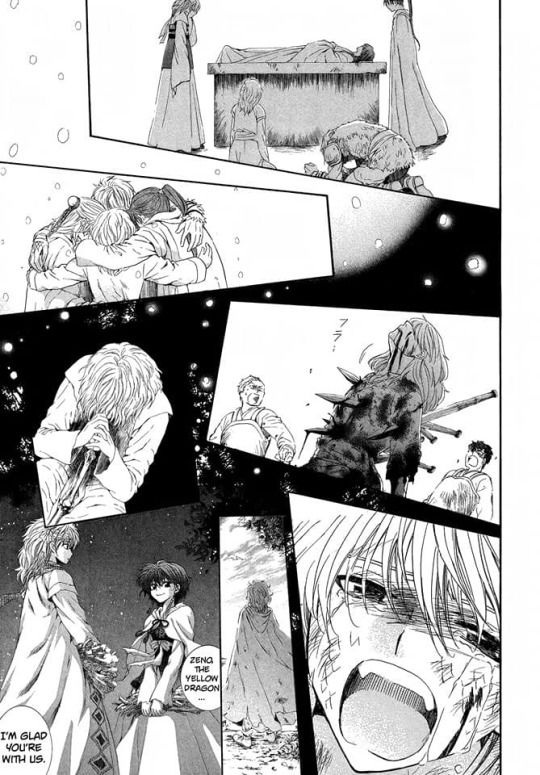
#akayona#yona#zeno#hiryuu#super interesting discussion to have again...really ty for bringing up all these points!#i hope i didn't end up just repeating what you said too much
70 notes
·
View notes
Note
What do you think about the theories that Jason was sexually abused as a child? Or even possibly while he was comatose after his resurrection?
Implications of this theory include his conversation with Mia (Speedy) and Bruce's message (Battle for the Cowl). In addition, when he was Robin he expressed what was then considered uncharacteristic rage towards the perpetrators of sex crimes.
Garzonas - unrepentant rapist who got no consequences
When a woman killed her sister's rapist and murderer (because Batman's evidence was not admissible in court), Batman said that she went too far with murder. Jason's disagreed with "Good riddance". Good for you, Jason.
His recklessness when dealing with a child sex trafficking ring.
I highly doubt that DC would ever confirm this theory. I would rather they leave it ambiguous because I don't trust them to not botch Jason... much less respectfully address the subject matter.
I have read so many thoughts on Jason that they're starting to blend together. So I apologize if you've already answered this before.
Hello friend! Aside from the fact that I took way too much time to answer your ask, this was also a hard question to come up with an answer to, I wanted to remain respectful of the subjects at hand even though I don’t second this headcanon. But before we keep going, let me put some trigger warnings in this post.
trigger warning: mentions of sexual abuse, child abuse, rape.
First, I would like to bring up these two concepts because I oftentimes mix them up when talking about these “ideas”.
Theory: a supposition or a system of ideas intended to explain something; an idea used to account for a situation or justify a course of action.
Headcanon: Headcanon generally refers to ideas held by fans of series that are not explicitly supported by sanctioned text or other media. Fans maintain the ideas in their heads, outside of the accepted canon.
I think the idea of Jason having been sexually abused at any point in his lifetime is a mix between a theory and a headcanon. Why I am saying this? Because as you have put in the ask, there has been instances where fandom has found pieces of information that they have considered the base of this idea.
So, if we say that there is a piece of text that might support that idea and they build from that to justify a course of action we would be looking at a theory. In this case Jason having been abused would the reason as to why he acts in that strong and violent way towards cases of sexual abuse/harassment.
In the other hand those pieces of text might not support that idea so fandom headcanons that idea in order to build another layer to a character, in this case Jason having been abused would also justify his actions towards certain criminals.
The “text” (panels, issues, mentions) are most of the time ambiguous, which makes readers have different perspectives in what is being written and what then is made into a theory or headcanon.
Personally, I don’t like this theory or headcanon for various reasons (which I will explain later in the post), and I have read and understood those moments mentioned as Jason just having survived Crime Alley as something general, I don’t think he suffered that kind of abuse but I think he was made aware of that type of behaviour every day that he spent alone in the streets and that why we saw Jason in Batman #408 saying that he had “graduated a long time ago from the streets of crime alley”.
Having said that, I do understand that some of the moments mentioned can be seen as ambiguous and that’s what leads people to theorize/headcanon that idea, because of that I would like to show the panels mentioned in your ask so everyone can read them and make up their own conclusions and then I will talk about the reasons why I don’t like this particular theory/headcanon.
As Robin:
Batman (1940) #422
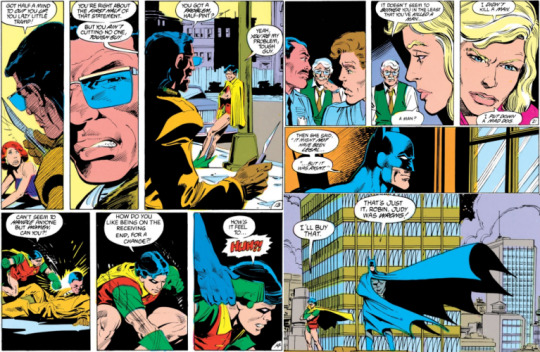
In these panels we can see Jason as Robin jumping in to defend a woman that was being attacked by a man. There I only see Jason acting like a vigilante would, maybe he was hitting too hard or whatever but Batman has hit people as much as Jason was doing it this time around, plus I, personally, don’t see any kind of problem with Jason beating a man that was harassing and threatening a woman with death.
Right beside we have Jason being on the side of the woman that killed her sister’s attacker. He didn’t see any problem with that woman seeking justice for her sister on her own when the police, Batman and himself couldn’t get the job done.
Here I see Jason having a big problem with authorities and justice system, which is not something new, in Batman #408, Jason says very clearly that he doesn’t trust the system in Gotham (the police, social workers and such), and he was also shown in that comic talking very fondly about his mother and about how much he cared for her when she was at her worst. Let’s remember that Jason loved his mother, he took care of her and resented his father for being abusive towards her and even introducing her to drugs.
Instead understanding these panels as Jason having been abused himself, I see it more as Jason having a humongous understanding of how much women and others suffer in Gotham due to the justice system’s lack of action. I also see Jason as the kind of boy that respected all women and could not sit and do nothing when people were hitting and abusing women just like his father did to his mother.
Batman (1940) #424
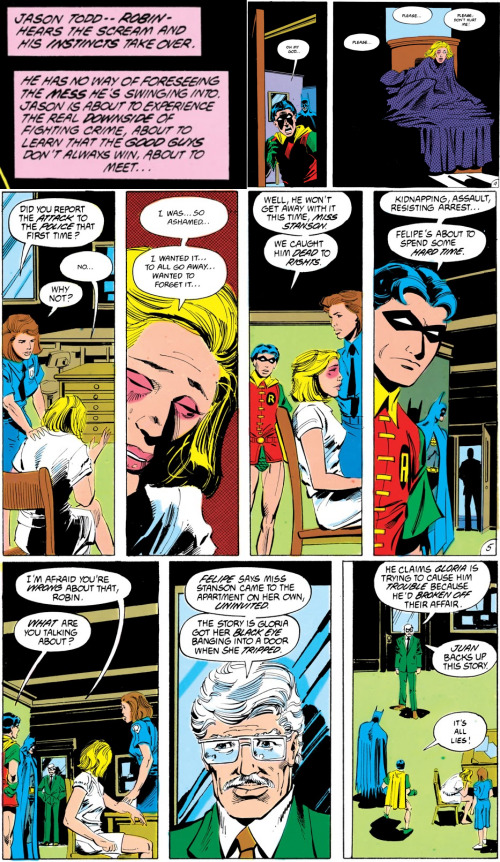
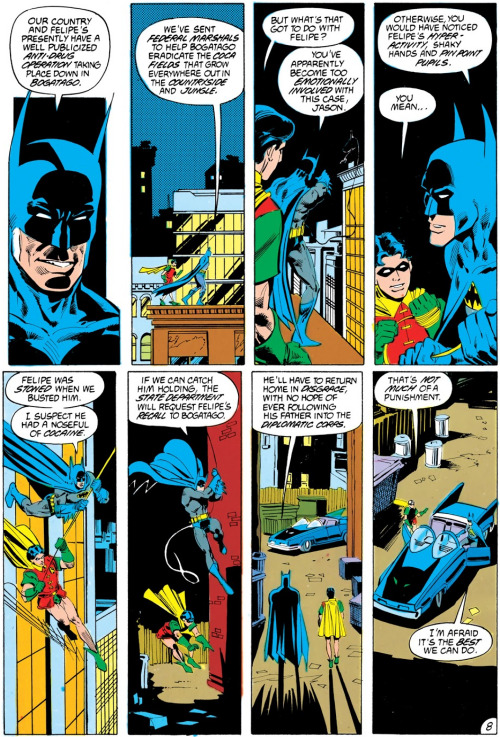
This issue starts by saying that Jason jumps into action as soon as he hears someone scream but that he wasn’t going to be prepared to see what was happening. This is the issue where all of us meet Felipe Garzonas, the abuser and rapist of many women. At first Jason doesn’t know what Felipe was doing but after he and Batman “defeat” Felipe, he goes to the room where he finds Gloria in a bed badly hurt and scared. Jason is shocked when he first finds her and after hearing her story in the police station, he becomes more and more happy about the fact that by having caught Felipe, he and Batman would be able to offer some peace and justice to Gloria after he goes to jail, but that doesn’t happen.
They had all the evidence to put Felipe in jail and the police could easily see that Gloria was the victim but because Felipe had someone to back his made-up story up, he was able to not be arrested and jailed.
Jason once again is baffled at the lack of action by the police or simply justice not being able to be made in favour of the true victim. Batman even says that he has noticed that Jason “had become to emotionally invested with the case” which could favour either idea (Jason having suffered sexual abuse or not), in my case I see this once again as Jason not being able to remain calm after doing everything to keep that woman safe and the justice system not being able to do it themselves in a more permanent way (jail time, or whatever).
But that’s not all because Jason being too emotional with that case was brought up as a way to show that Jason couldn’t see that Felipe had been under the influence of drugs, which is something that Jason can see in people very well (do to experience with his mother and his training with Batman). So, Felipe is now a rapist, an abuser, he does drugs and he also has a market for it.
Because Felipe was allowed to go back to his “normal” life he had Gloria be killed, and he kept abusing drugs and women, when Jason finds Gloria’s dead body and that Batman still seems to abide the justice system he snaps. He goes alone to see Felipe and that’s were this iconic panel comes from. The moments before Jason made his first kill and felt no remorse about it. I know this is kinda soft topic because Jason was a teenager, but good for him, kill that bitch. Gotham doesn’t need more people like him.
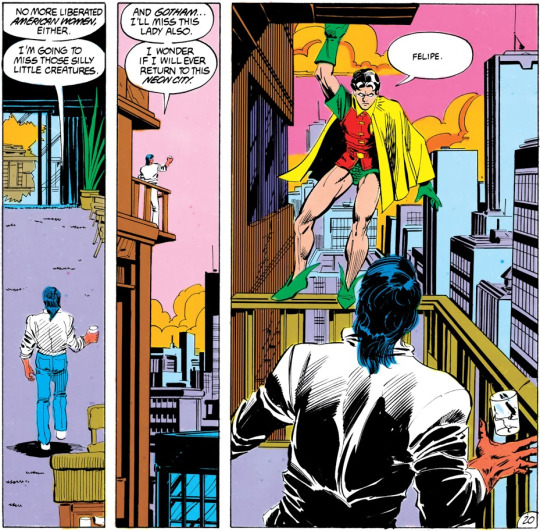
Batman (1940) #226
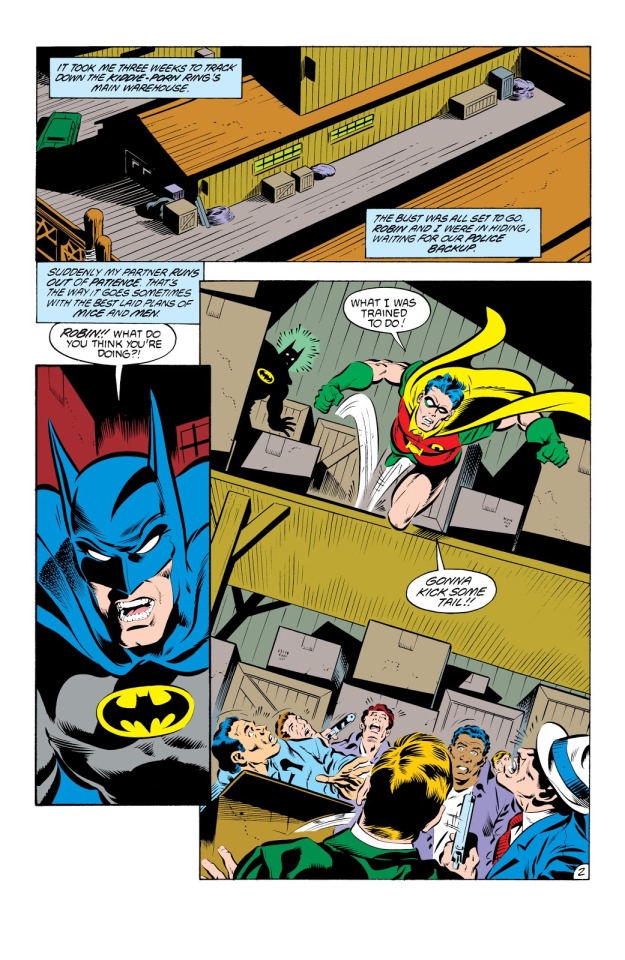


This is the issue where Jason attacks the men that were involved with some very nasty stuff involving children. Batman narrates and says that him and Jason had been working on this case for three weeks. Jason jumps into action suddenly and “recklessly” even though Batman considered their investigation wasn’t over, he also says that he thinks that Jason had been “acting oddly” and that he was very “moody, resentful and reckless” and that that attitude could “get him killed”.
This could be used as to add more proof of the abuse idea but I actually see it as build up to Jason’s death, that happened two issues later. Let’s remember that Jason found out of his birth mother and was desperate to find and save her from Joker, because he was a good son but also because he didn’t feel like Bruce loved, cared or appreciated him anymore. Ever since Jason made it clear that he didn’t see the world and justice in the same way that Batman did back in issue #422, Jason and Bruce’s relationship suffered, they just couldn’t see eye to eye on some subjects and Bruce’s neglect or lack of care for what Jason believed in drove Jason to act the way he did in the case involving his mother and the Joker.
Jason obviously has major issues with kids being abused and put in dangerous situations, he as the Red Hood (Winick’s Red Hood) is the same, he really wants kids to be taken far away from drugs so they cannot be manipulated, used and abused by Gotham’s Drug Lords. Here I can see some of the same thing, Jason being protective of those kids and getting fed up with how much time he and Batman had to wait to do anything about the subject, along side it I bet Jason wasn’t seeing the police or the justice system doing anything about the whole thing so that could have probably fuelled his desperate attack of those horrible people.
As Batman/Red Hood:
Batman: Battle for the Cowl #3

Battle for the Cowl… yeah I am going to be brutally honest about this, if anyone thinks that this is someway or somehow proof that Jason had been abused in the past then I think we have very different ways of thinking how survivors must be treated or written in comics and other media.
This to me is pure bad writing, this is some of the worst things I have seen being written in comics. Whether or not this implies Jason being abused or not, Bruce’s message is absolutely disgusting and not at all helpful, it is even worse when you realise that Dick, a canon sexual assault survivor, is the one playing the message to Jason even though Jason explicitly said that he didn’t want to hear it again. That Book, issue, page and panel are extremely badly written and is one of the most terrible Jason and Dick characterizations ever.
So, I don’t really care if this panel is supposed to offer support to that theory or headcanon, I really dislike that speech and if it is actually referencing Jason as being a survivor of child abuse, then Tony S. Daniel needs to make an apology from today to the day he dies.
“Of all my failures, you have been my biggest” “You were broken and I thought I could put the pieces back together. I thought I could do for you what could never be done for me. Make you whole” “What happened to you as a child… the terror, the pain, the horrors” “You needed repair and instead I gave you an outlet to act out on”
Absolute garbage writing. Me, as Bruce is number one hater, know that that speech is even out of character for Bruce. Listen, if Jason had been a victim of sexual assault or just being a kid living alone in Crime Alley, no one should leave a message like that, telling a victim that they were broken and needed fixing, what the hell? No, thank you, this issue proves nothing except that Battle for the Cowl was a mistake as a whole.
Green Arrow (2001) #72
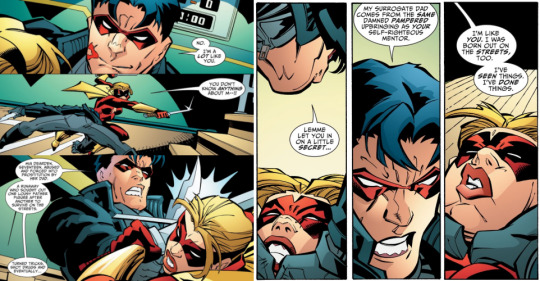
Judd Winick is clever I will always say that, and while I do see why people think that Jason is making the “child abuse idea” canon I still think that the way that he talks is still fairly ambiguous if not just him playing mind games with Mia.
I know it sounds wrong, but hear me out, Winick, in this arc makes Batman say that Jason distracted him and Oliver just to take Mia as a “hostage” because that was Jason’s way to mess with him. This arc happens right after UtRH and Jason is a bit more unhinged than ever. But he doesn’t harm Mia, he just talks to her, he tries to make her see why he acts the way he does and to do that he talks about how much he sees of himself in her. Do I believe that Jason suffered the same things Mia did? No. Do I think that their past is similar? Yes.
But Jason doesn’t only use the fact that they have similar pasts to make Mia rebel against her “no killing ways” and Oliver like he did with Bruce, but he also brings up the fact that their past is incredibly different to the lives of Bruce and Oliver, and that those differences are of importance.
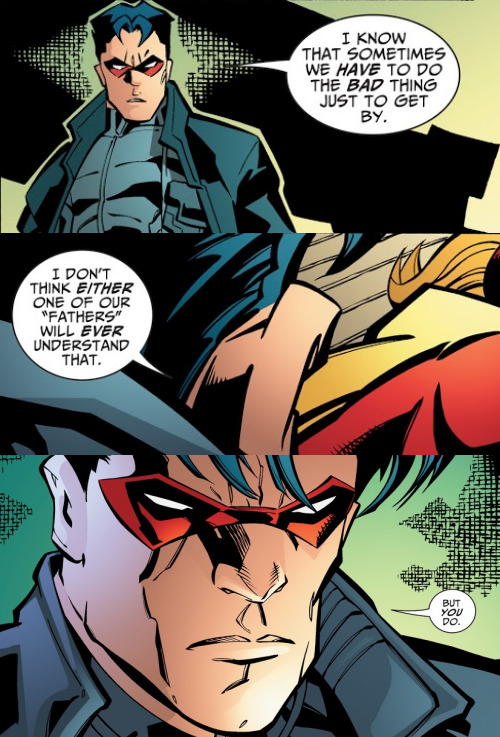
Maybe it’s just me, but I didn’t see Jason bringing Mia’s past for anything other than manipulating her and kinda make her see Oliver in a negative light the way that he does Batman and Bruce. Jason was at a point in his life where all he wanted to do was deliver the same pain that he had gone through but he didn’t do it by physically harming anyone (Mia was left unscratched), he was just out there trying to play mind games so he could break more havoc in Batman’s name.
Mia’s past is just way too different to whatever we have seen in canon from Jason’s past. Maybe I am wrong, after all, I only read about Mia in that arc.
-
With all that having been said I think it’s pretty obvious that I just don’t think that Jason’ having been sexually abused as a child actually happened, and I also don’t like to think about his past in that way. His canon suffering could have made him act that violently against criminals involved with sexual attacks and drug-related crimes, but I also think that’s just how Jason was, he really disliked the justice system in Gotham and saw how much it failed to protect victims, so now that he had the training to help those who couldn’t do it for themselves, he tried his best to bring criminals to justice.
And when that didn’t work, he grew more and more frustrated with Batman’s methods which led him to be more unforgiving and violent.
I also don’t like the theory/headcanon as a whole because I think its one of those things that Fandom comes up with just for that extra angst factor in their favourite character’s story so they can make him suffer more and because of that no other Robin or character as a whole can ever understand his pain or whatever. In this fandom there is a lot of “competitive trauma” going on and I honestly dislike it a lot.
About Jason having been assaulted while he was in a coma, I don't really know, he was at a hospital for what I believe were six moths, maybe that idea comes from real life happenings but I have never thought of that happening in Jason's life and I would rather not give it much more thought.
Also, I believe that DC just like fandom would have never been able to handle the subject of Jason having been a sexual assault survivor with the respect and care that it actually needs. We have seen DC treat sexual harassment and abuse as nothing but a side plot or bringing it up in an extremely disturbing way. In Fandom some (very few) people end up glamorising or romanticising these subjects so, I don’t believe the comic world was or is ready to treat a backstory like this with the respect it needs.
Maybe I haven’t even treated the subject with the respect and care that it needs and if that’s the case then I am truly sorry.
I had never answered a question regarding this subject before and I really appreciate all the questions you send my way; they do make my brain happy. I am really sorry it took me this long to write an answer to you but I hope the post is good enough for all the time I made you wait!
I hope you have an amazing week!
#jason todd#red hood#robin jason todd#batman#tati writes and is nervous about it#theories and headcanons#dc comics
83 notes
·
View notes